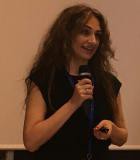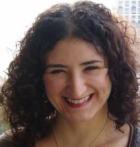Risultati: 18

Funzione/Ruolo
Professoressa ordinaria di Linguistica alla Scuola Universitaria di Studi Superiori IUSS Pavia
Percorso professionale
Si forma in linguistica alla Scuola Normale Superiore di Pisa. Nel corso del dottorato di ricerca, conseguito nel 2007 sempre alla Scuola Normale Superiore di Pisa, intraprende studi di neurolinguistica, conducendo esperimenti di risonanza magnetica funzionale e di elettroencefalografia sulla comprensione della metafora verbale. Nel 2009, grazie ad un finanziamento ottenuto dalla Regione Toscana per la creazione di un test per la valutazione dei disturbi comunicativi nella patologia, diventa ricercatrice junior. Nel 2011 si sposta alla Scuola Universitaria di Studi Superiori IUSS di Pavia, prima come ricercatrice senior e poi come Professoressa Associata e, dal 1° novembre 2022, Ordinaria. Come docente a contratto o “visiting lecturer”, ha insegnato neurolinguistica e pragmatica sperimentale in vari atenei in Italia e all’estero, tra cui l’Università Vita-Salute S. Raffaele di Milano, l’Università di Pisa, l’Università di Verona, l’Università di Zurigo, la Scuola Normale Superiore di Pisa, l’Università di Trondheim. Alla Scuola IUSS coordina il Dottorato in Neuroscienze Cognitive e Filosofia della Mente, a titolo congiunto con l’Università Vita-Salute S. Raffaele di Milano.
Risultati scientifici
Si occupa di neurolinguistica, con particolare riferimento alle abilità comunicative cosiddette ‘pragmatiche’, che permettono di comunicare efficacemente e di andare oltre il significato letterale delle parole. I suoi risultati scientifici riguardano principalmente due filoni di ricerca. Il primo è incentrato sui meccanismi neurofisiologici che consentono la comprensione degli impliciti linguistici, come le metafore, l’ironia e le battute umoristiche. Si tratta di fenomeni molto frequenti, che da un lato apportano benefici alla comunicazione (ad esempio rendendola più efficace), ma dall’altro producono un aumento dei costi di elaborazione nel nostro cervello. In questo ambito ha realizzato uno studio di neuroimmagine sulla comprensione delle metafore e diversi studi con registrazione dell’elettroencefalogramma.
Il secondo filone di ricerca riguarda i disturbi del linguaggio, in particolare il disturbo pragmatico del linguaggio. Tale disturbo può manifestarsi nel neurosviluppo (ad esempio nello spettro autistico) ma anche in individui adulti affetti da patologie neurologiche o psichiatriche. Esso comporta difficoltà ad avere conversazioni adeguate al contesto e a cogliere gli aspetti più coloriti ed emotivi del linguaggio, compromettendo dunque gravemente la sfera sociale dell’individuo. In questo ambito di ricerca ha coordinato un progetto finanziato dalla Regione Toscana (2010-2013), che ha portato alla creazione del test APACS (“Assessment of Pragmatic Abilities and Cognitive Substrates”). APACS è stato utilizzato per descrivere il disturbo pragmatico del linguaggio in varie popolazioni, tra cui schizofrenia, sclerosi laterale amiotrofica, sclerosi multipla, dislessia, trauma cranico e malattia di Parkinson. Il test APACS è in corso di adattamento dall’italiano ad altre lingue.
Dal 2017 coordina il progetto “The interpretative brain”, finanziato dal MIUR e finalizzato alla creazione di strumenti di riabilitazione e promozione delle abilità pragmatiche nella patologia e nell’arco di vita. Il progetto si occupa anche dello studio dei rapporti tra abilità comunicative e abilità di cognizione sociale (teoria della mente), attraverso studi comportamentali e neurofisiologici.
Nel 2017 ha fondato (insieme a F. Domaneschi) il network XPRAG.it (Experimental Pragmatics in Italy), che mira a offrire un forum italiano per discutere – a livello internazionale – di temi di pragmatica in chiave sperimentale.
Attività editoriali e pubblicazioni
È autrice di numerose pubblicazioni scientifiche su riviste e volumi nazionali ed internazionali, fra cui:
In italiano a carattere didattico/divulgativo:
[2017] Bambini V. Il cervello pragmatico. Carocci.
[2017] Bambini V. Dove risiede il linguaggio? Linguaggio, cervello e neurolinguistica.In Masini F, Grandi N (a cura di), Tutto ciò che hai sempre voluto sapere sul linguaggio e sulle lingue, Caissa Italia, 113-116.
[2013] Bambini V. La lingua di Dante entra in risonanza: contributi italiani allo studio dei correlati neurobiologici del linguaggio. In Maraschio N, De Martino D (a cura di), L’italiano dei saperi. Ricerca, scoperta, innovazione, Le Lettere, 7-23.
In inglese a carattere specialistico:
[2019] Canal P, Bischetti L, Di Paola S, Bertini C, Ricci I, Bambini V. ‘Honey, shall I change the baby? – Well done, choose another one’: ERP and time-frequency correlates of humor processing.Brain and Cognition.
[2019] Bambini V, Canal P, Resta D, Grimaldi M. Time-course and neurophysiological underpinnings of metaphor in literary context. Discourse Processes, 56:77-97.
[2018] Lecce S, Ronchi L, Del Sette P, Bischetti L, Bambini V. Interpreting physical and mental metaphors: Is Theory of Mind associated with pragmatics in middle childhood?. Journal of Child Language.
[2018] Schaeken W, Van Haeren M, Bambini V. The understanding of scalar implicatures in Children with Autism Spectrum Disorder: Dichotomized responses to violations of informativeness.Frontiers in Psychology, 9:1266.
[2016] Bambini V, Arcara G, Martinelli I, Bernini S, Alvisi E, Moro A, Cappa S, Ceroni M. Communication and pragmatic breakdowns in amyotrophic lateral sclerosis patients. Brain and Language, 153–154:1–12 .
[2016] Arcara G, Bambini V. A test for the Assessment of Pragmatic Abilities and Cognitive Substrates (APACS): Normative data and psychometric properties. Frontiers in Psychology, 7:70
[2016] Bambini V, Bertini C, Schaeken W, Stella A, Di Russo F. Disentangling metaphor from context: An ERP study.Frontiers in Psychology, 7:559.
[2016] Bambini V, Arcara G, Bechi M, Buonocore M, Cavallaro R, Bosia M. The communicative impairment as a core feature of schizophrenia: Frequency of pragmatic deficit, cognitive substrates, and relation with quality of life. Comprehensive Psychiatry, 71:106-120.
[2014] Catani M, Bambini V. A model for Social Communication And Language Evolution and Development (SCALED).Current Opinion in Neurobiology, 28:165-171.
[2014] Weiland H, Bambini V, Schumacher P. The role of literal meaning in figurative language comprehension: evidence from masked priming ERP. Frontiers in Human Neuroscience, 8:583.
[2011] Bambini V, Gentili C, Ricciardi E, Bertinetto PM, Pietrini P. Decomposing metaphor processing at the cognitive and neural level through functional magnetic resonance imaging, Brain Research Bulletin 86(3-4):203-216.

Funzione/Ruolo
Professoressa ordinaria di Psicologia sociale all'Università di Padova
Percorso professionale
Dopo la laurea in Filosofia presso l’università di Trieste (1988) ha conseguito il Dottorato di ricerca in Psicologia Sociale presso la University of Oregon nel 1996. Nel 1996 inizia, come ricercatrice, la sua carriera all'Università di Padova, dove attualmente è professoressa ordinaria.
Risultati scientifici
Attività di ricerca su temi legati al genere. Fra questi è stato indagato il problema dell’oggettivazione sessuale della donna e delle molestie sessuali ed il modo in cui i media, per esempio la TV italiana, sostengono tali fenomeni. Tale filone di ricerca ha dimostrato che la visione di spezzoni di TV italiana con una rappresentazione delle donne sessualmente oggettivate aumenta l’adesione alle norme di genere tradizionali, che a sua volta incrementa la propensione alle molestie sessuali. All’interno della costruzione di un programma di alfabetizzazione mediatica, è stato inoltre dimostrato come la visione di filmati di denuncia dell’oggettivazione sessuale femminile aumenti l’intenzione di intraprendere azioni collettive, come firmare una petizione contro i media sessisti e oggettivanti, ma solo da parte delle partecipanti donne. Inoltre, la visione da parte di un gruppo di partecipanti maschi di un filmato di denuncia è stata efficace nel ridurre le loro azioni di molestia sessuale, come l’invio di barzellette sessiste ad una donna sconosciuta, e la loro intenzione di intraprendere molestie sessuali più gravi come ricatti qui pro quo.
Attività editoriali e pubblicazioni
Associate Editor per l'European Journal of Social Psychology dal 2001 al 2004.
Revisora ad-hoc per le seguenti riviste scientifiche: Journal of Personality and Social Psychology, Journal of Experimental Social Psychology, European Journal of Social Psychology, Social Cognition, Group processes and Intergroup relations, British Journal of Social Psychology, Social Psychology and Personality Science, European Journal.
Di seguito una lista di pubblicazioni internazionali:
(2017) Fasoli, F., Cadinu, M., Carnaghi, A., Galdi, S., Guizzo, F., & Tassara, L. How do you self-categorize? Gender and sexual orientation self-categorization in homosexual/heterosexual men and women. Personality and Individual Differences. doi: https://doi.org/10.1016/j.paid.2017.11.011
(2017) Galdi, S., Maass, A., & Cadinu, M. Defending the Victim of Sexual Harassment: The Influence of Civil Courage and Media Exposure. Psychology of Women Quarterly, doi: 0361684317709770.
(2017) Guizzo, F., Cadinu, M. Galdi, S., Maass, A., Latrofa, M. Objecting to Objectification: Women's Collective Action Against Sexual Objectification on Television. Sex Roles. doi: 10.1007/s11199-016-0725-8
(2016) Guizzo, F., & Cadinu, M. Effects of Objectifying Gaze on Women’s Cognitive Performance: the Role of Flow Experience and Internalization of Beauty Ideals. British Journal of Social Psychology. doi: 10.1111/bjso.1217
(2016) Pacilli, M.G., Tomasetto, C. & Cadinu, M. Exposure to Sexualized Advertisements Disrupts Children’s Math Performance by Reducing Working Memory.Sex roles: A Journal of Research.DOI: 10.1007/s11199-016-0581-6.
(2015) Hunt, C. J., Fasoli, F., Carnaghi, A., & Cadinu, M. Masculine Self-Presentation and Distancing From Femininity in Gay Men: An Experimental Examination of the Role of Masculinity Threat. Psychology of Men & Masculinity. doi:10.1037/a0039545..
(2014) Galdi, S., Maass, A., & Cadinu, M. Objectifying media: Their effect on gender role norms and sexual harassment of women. Psychology of Women Quarterly, 38, 398-413. doi: 10.1177/0361684313515185.
(2013) Cadinu, M., Galdi, S., &Maass, A. Chameleonic social identities: Context induces shifts in homosexuals’ self-categorization and self-stereotyping. European Journal of Social Psychology, 43, 474-481. doi: 10.1002/ejsp.1957
(2013) Galdi, S. Cadinu, M., & Tomasetto, C. In Search of the Roots of Stereotype Threat: The Activation of Math-gender Stereotypes Disrupts Girls’ Performance in Absence of Stereotype Awareness. Child Development. doi:10.1111/cdev.12128
(2013) Maass, A., Cadinu, M., Galdi, S. Sexual Harassment: Motivations and consequences. In M.K. Ryan &N.R. Branscombe (Eds.) The Sage Handbook of Gender and Psychology (cap. 21, pp. 341-358). London: Sage.
(2013) Cadinu, M., Latrofa, M., &Carnaghi, A. Comparing Self-Stereotyping with Ingroup- Stereotyping and Outgroup-Stereotyping in Unequal Group Contexts: the case of Gender. Self and Identity, 12, 582-596. Taylor and Francis online. doi:10.1080/15298868.2012.712753.
(2006) Maass, A., & Cadinu, M. Protecting a threatened identity through sexual harassment: A social identity interpretation. In R. Brown &D. Capozza (Eds.). Social Identities: Motivational, emotional, cultural influences (pp. 109-131). Hove, England. Hove, England: Psychology Press/Taylor &Francis (UK).
Riconoscimenti e premi
Membro della Executive Committee della European Association of Social Psychology - mandato elettivo di 6 anni (2011-2017).

Funzione/Ruolo
Professoressa associata di Neurologia all'Università di Padova
Percorso professionale
Dopo la laurea in Medicina e Chirurgia all’Università Campus Bio-Medico di Roma, nel 2001, Florinda Ferreri si specializza in Neurologia nella stessa Università. Nel 2006 è Assistente per la Ricerca all’Istituto di Psichiatria sperimentale dell’Università del Wisconsin-USA e nel 2012 consegue il dottorato di ricerca in Neurofisiologia Clinica presso l’University of Eastern Finland. Negli ultimi dieci anni, oltre a lavorare come Neurologa Clinica al Policlinico Universitario Campus Biomedico di Roma, è attivamente impegnata nella ricerca neurofisiologica. Dal 2018 è Professoressa associata di Neurologia all'Università degl studi di Padova.
Risultati scientifici
L’attività di ricerca di Florinda Ferreri è prevalentemente focalizzata sullo studio non invasivo della fisiologia della corteccia cerebrale umana nell’individuo sano, nell’invecchiamento fisiologico e patologico, sullo studio della plasticità cerebrale, sullo sviluppo di metodiche di neuromodulazione non invasiva con potenzialità terapeutiche nelle demenze neurodegenerative e vascolari, e sulla ricerca di markers neurofisiologici per la diagnosi e la progressione della demenza di Alzheimer. Tra il 2007 ed il 2014 fa parte del gruppo di ricerca internazionale per la messa a punto di una protesi biomeccatronica di arto superiore a controllo neurale, partecipando nel 2008 e nel 2013 all’impianto della protesi su due pazienti amputati. È attivamente impegnata nella messa a punto di tecniche avanzate di registrazione multimodale dei segnali elettrici cerebrali con attuale focus sulla co-registrazione TMS-EEG, ovvero la combinazione della stimolazione magnetica transcraniale (Transcranial Magnetic Stimulation) con l’elettroecefalografia (Elettroencephalography).
Attività editoriali e pubblicazioni
E’ autrice di numerose pubblicazioni scientifiche internazionali tra cui:
[2016] Ferreri F, Vecchio F, Vollero L, Guerra A, Petrichella S, Ponzo D, Määtta S, Mervaala E, Könönen M, Ursini F, Pasqualetti P, Iannello G, Rossini PM, Di Lazzaro V. Sensorimotor cortex excitability and connectivity in Alzheimer’s disease: A TMS-EEG Co-registration study. Human Brain Mapping, 37[6):2083-96. doi: 10.1002/hbm.23158.
[2016] Guerra A, Pogosyan A, Nowak M, Tan H, Ferreri F, Di Lazzaro V, Brown P. Phase Dependency of the Human Primary Motor Cortex and Cholinergic Inhibition Cancelation During Beta tACS. Cerebral Cortex, 26(10):3977-90. doi: 10.1093/cercor/bhw245.
[2015] Rossini PM, Burke D, Chen R, Cohen LG, Daskalakis Z, Di Iorio R, Di Lazzaro V, Ferreri F, Fitzgerald PB, George MS, Hallett M, Lefaucheur JP, Langguth B, Matsumoto H, Miniussi C, Nitsche MA, Pascual-Leone A, Paulus W, Rossi S, Rothwell JC, Siebner HR, Ugawa Y, Walsh V, Ziemann U. Non-invasive electrical and magnetic stimulation of the brain, spinal cord, roots and peripheral nerves: Basic principles and procedures for routine clinical and research application.An updated report from an I.F.C.N. Committee. Clinical Neurophysiology Journal,. Feb 10. Review.
[2014] Di Pino G, Pellegrino G, Assenza G, Capone F, Ferreri F, Formica D, Ranieri F, Tombini M, Ziemann U, Rothwell JC, Di Lazzaro V. Modulation of brain plasticity in stroke: a novel model for neurorehabilitation. Nature Reviews Neurology, 10(10):597-608.
[2014] Ferreri F, Vecchio F, Ponzo D, Rossini PM. Time-varying coupling of EEG oscillations of primary motor cortex predicts excitability fluctuations as reflected by motor evoked potentials amplitude: an EEG-TMS study. Human Brain Mapping, 35(5):1969-80.
[2013] Ferreri F, Rossini PM. TMS and TMS-EEG techniques in the study of the excitability, connectivity, and plasticity of the human motor cortex. Reviews Neuroscience, 24(4):431-42. Review.
[2011] Ferreri F, Pasqualetti P, Määttä S, Ponzo D, Ferrarelli F, Tononi G, Mervaala E, Miniussi C and Rossini PM. Imaging human brain cortical effective connectivity during single and paired pulse transcranial magnetic stimulation. Neuroimage, 1;54(1):90-102.
[2006] Ferreri F. Curcio G. Patrizio P. De Gennaro L. Fini R. and Rossini PM. Mobile phone emission and human brain excitability. Annals of Neurology, 60(2):188-96.
[2006] Babiloni C, Benussi L, Binetti G, Cassetta E, Dal Forno G, Del Percio C, Ferreri F, Ferri R, Frisoni G, Guidoni R, Miniussi C, Rodriguez G, Romani GL, Squitti R, Ventriglia MC and Rossini PM. Apolipoprotein e and alpha brain rhythms in mild cognitive impairment: a multicentric eeg study. Annals of Neurology, 59(2):323-34.
[2003] Ferreri F, Pauri F, Pasqualetti P, Fini R, Dal Forno G, PM Rossini. Motor cortex excitability in Alzheimer Disease. Annals of Neurology, 53(1):102-8.

Funzione/Ruolo
Team leader U-Vip Unit dell'Istituto Italiano di Tecnologia (ITT) di Genova
Percorso professionale
Dopo la laurea in Psicologia all'Università di Firenze nel 2004, prosegue la sua formazione all'interno del VisionLab del CNR di Pisa. Nel 2008 dedica un anno alla ricerca presso il laboratorio VisionScience di Berkeley in California e, l'anno successivo, consegue il dottorato di ricerca in Tecnologie Umanoidi presso l'Istituto Italiano di Tecnologie dell'Università di Genova. Attualmente Monica Gori è team leader dell'Unità per le persone con disabilità visive (U-Vip Unit) dell'Istituto Italiano di Tecnologia di Genova.
Risultati scientifici
Monica Gori si occupa di sviluppo, integrazione multisensoriale, percezione sensoriale-motoria e disabilità visiva. Attraverso la sua ricerca studia come le capacità di percezione uni sensoriale e multi sensoriale interagiscono durante lo sviluppo dei bambini con e senza disabilità. L'obiettivo dello studio è quello di sfruttare questa conoscenza per comprendere meglio la funzionalità cerebrale, creare nuovi programmi di riabilitazione e sviluppare nuovi dispositivi meccatronici (che uniscono meccanica, elettronica e informatica) per aumentare le capacità senso-motorie dei bambini con disabilità sensoriali. Dal febbraio 2014 è coordinatrice del progetto europeo ABBI, il cui scopo è proprio lo sviluppo di una nuova tecnologia basata sulla riabilitazione senso-motoria per i non vedenti. Nello specifico ABBI (Audio Bracelet for Blind Interactions) prevede sia la realizzazione tecnica di un dispositivo sonoro non invasivo che stimoli la percezione spaziale dei ciechi, sia la verifica della sua efficacia su un campione di circa 150 bambini e adolescenti non vedenti. Il progetto prevede lo studio e la realizzazione di un dispositivo sonoro indossabile, simile a un braccialetto, utile anche per creare reti sonore da dislocare negli ambienti in cui i non vedenti vivono, permettendo così che l'udito, e non la vista, crei una mappa spaziale nella quale la persona potrà muoversi.
Attività editoriali e pubblicazioni
Monica Gori è autrice di capitoli di libri e di numerosi articoli scientifici su riviste internazionali, tra cui:
(2018) Gori, Amadeo, Campus Temporal cues influence space estimations in visually impaired individuals. iScience, vol. 6, pp. 319-326.
(2018)Campus, Sandini, Concetta Morrone, & Gori. Spatial localization of sound elicits early responses from occipital visual cortex in humans. Scientific Report.
(2017) Gori, Cappagli, Tonelli, Baud-Bovy, Finocchietti. Devices for visually impaired people: high technological devices with low user acceptance and no adaptability for children Neuroscience & Biobehavioral Reviews.
(2017) Gori, Cappagli, Baud-Bovy, & Finocchietti. Shape Perception and Navigation in Blind Adults. Frontiers in Psychology.
(2017) Cappagli, Cocchi, & Gori. Auditory and proprioceptive spatial impairments in blind children and adults. Developmental Science, 2017.
(2016) Cuturi, Aggius-Vella, Campus, Parmiggiani, and Gori. From science to technology: orientation and mobility in blind children and adults. Neurosci and Biobe. Reviews 2016, impact factor 10.5 citations 2 (2016) Cappagli G, Gori M. Auditory spatial localization: Developmental delay in children with visual impairments. Research in Developmental Disabilities, 53-54:391-8.
(2016) Tonelli A, Brayda L, Gori M. Depth echolocation learnt by novice sighted people. PLoS ONE, 11(6):e0156654.
(2016) Vercillo T, Burr D, Gori M. Early visual deprivation severely compromises the auditory sense of space in congenitally blind children. Developmental Psychology, 52(6):847-53.
(2015) Finocchietti S, Cappagli G, Porquis LB, [...], Cocchi E, Gori M. Evaluation of the Audio Bracelet for Blind Interaction for improving mobility and spatial cognition in early blind children - A pilot study. Proceedings of the Annual International Conference of the IEEE Engineering in Medicine and Biology Society, EMBS.
(2015) Magnusson C, Rydeman B, Finocchietti S, [...], Baud-Bovy G, Gori M. Co-located games created by children with visual impairments. MobileHCI 2015, Proceedings of the 17th International Conference on Human-Computer Interaction with Mobile Devices and Services Adjunct.
(2015) Tinelli F, Anobile G, Gori M, [...], Cioni G, Concetta Morrone M. Time, number and attention in very low birth weight children. Neuropsychologia, 73:60-9.
Riconoscimenti e premi
Il suo articolo Young children do not integrate visual and haptic form information è stato inserito nella F1000 (Gori et al. Curr Biol, 2008) e nel 2012 vince il premio TR35 per giovani innovatori. Nel 2016 viene premiata per il progetto WeDraw, due anni prima per il progetto ABBI, entrambi da lei coordinati.

Funzione/Ruolo
Professoressa di Neurologia presso l'Università della California, San Francisco
Percorso professionale
Dopo aver conseguito la laurea presso la Facoltà di Medicina e Chirurgia dell'Università di Brescia nel 1993, prosegue gli studi attraverso un tirocinio formativo in neurologia all'Università di Modena e Reggio Emilia. Successivamente, consegue un dottorato di ricerca in Neuroscienze all'University College di Londra e si specializza in Neurologia comportamentale al UCSF Memory and Aging Center di San Francisco. Negli ultimi anni Maria Luisa Gorno Tempini oltre a insegnare neurologia a San Francisco, si è impegnata nello studio delle malattie neurodegenerative, in particolare della demenza frontotemporale e dell'afasia primaria progressiva (PPA), anche attraverso l'utilizzo di tecniche di neuroimaging e di neuropsicologia del linguaggio.
Gorno Tempini irige il laboratorio di neurobiologia del linguaggio dell'UCSF Memory and Aging Center. Ha anche co-fondato il Centro Dislessia dell'UCSF nel 2015 ed è co-direttrice del centro.
Risultati scientifici
Al Centro Dislessia dell'UCSF, dirige un grande team multidisciplinare di clinici e scienziati con competenze in neurologia comportamentale, neuroscienze cognitive, patologia del linguaggio e tecniche avanzate di neuroimaging. Il suo lavoro nei disturbi del neurosviluppo mira a scoprire i distinti fenotipi clinici e biologici della dislessia e il miglior approccio per diagnosticarli e correggerli.
Attività editoriali e pubblicazioni
È autrice di oltre 170 articoli su riviste scientifiche sulla neurobiologia dei disturbi del linguaggio ed è stata invitata a parlare a conferenze in tutto il mondo, tra cui l'American Academy of Neurology e il Senato italiano.

Area STEM: Psicologia e neuroscienze
Competenze: psicologia dell’apprendimento, psicologia dello sviluppo
Parole chiave: adolescenza, apprendimento, bisogni educativi speciali, discalculia, disordini dello sviluppo, disturbi dell'apprendimento, impotenza appresa, infanzia, matematica, neuroscienze, numeri, plasticità cerebrale, plusdotazione, psicopatologia dell'apprendimento, strategie didattiche, sviluppo
Regione: Veneto
Funzione/Ruolo
Prorettrice con delega all'Orientamento e Tutorato per l'Università di Padova e Professoressa ordinaria di Psicologia dello Sviluppo presso la stessa università
Percorso professionale
Dopo aver conseguito la laurea in Filosofia nel 1988 e la laurea in Psicologia, nel 1991, presso l'università di Padova, prosegue la sua formazione, nel 1997, con un dottorato di ricerca in Psicologia dello Sviluppo all'Università di Leiden, in Olanda, su un progetto internazionale. La sua carriera continua all'interno dell'università: nel 1998 è ricercatrice in Psicologia dello Sviluppo, nel 2001 professoressa associata e nel 2005 professoressa ordinaria di Psicologia dello Sviluppo sempre all'Università di Padova. Dal 2007 è prorettrice con delega all'Orientamento e Tutorato per lo stesso ateneo, ruolo che ricopre a tutt'oggi.
Nell'aprile del 2020 è stata chiamata dalla ministra dell'Istruzione, Lucia Azzolina, a far parte dal comitato di esperti istituito presso il MIUR con il compito di "formulate e presentare idee e propose per la scuola con riferimento all'emergenza sanitaria in atto [Covid-19], ma anche guardando al miglioramento del sistema di Istruzione Nazionale".
Risultati scientifici
I principali interessi di ricerca di Daniela Lucangeli riguardano lo sviluppo e potenziamento dell'intelligenza numerica, i processi maturazionali nell'età evolutiva (prima e seconda infanzia, età scolare e adolescenza) e i meccanismi di apprendimento nello sviluppo tipico e atipico. Si occupa anche dello studio di funzioni (linguaggio, memoria, attenzione, emozioni, metacognizione, autoregolazione), dei disturbi dell'apprendimento (quali dislessia, disortografia, disgrafia, discalculia) e dei bisogni educativi speciali. Svolge inoltre ricerche e studi sul potenziamento dell'apprendimento, sui deficit comportamentali e cognitivi, sui profili giftedness ed alto potenziale, sulle emozioni nell'apprendimento e sull'impotenza appresa.
Con il gruppo di ricercatori e scienziati dell'Accademia Mondiale delle Scienze per le Difficoltà di Apprendimento, promuove da anni un forte movimento di azioni per la ricaduta della ricerca scientifica nelle prassi di prevenzione, potenziamento e riabilitazione delle disarmonie dello sviluppo. Difatti la ricerca scientifica ha messo in evidenza come attraverso l'intervento precoce nelle diverse "fatiche" dello sviluppo, sia possibile ottenere l'ottimizzazione dei processi anche nelle situazioni di eventuale disabilità (linguaggio, apprendimento, sviluppo cognitivo,ecc...). Il focus del suo lavoro non è solo quello relativo all'analisi dei profili cognitivi e all'eventuale diagnosi ma innanzitutto quello di utilizzare le migliori strategie di aiuto per il massimo di plasticità cerebrale.
Negli ultimi tempi si dedica allo studio dei network circuitali legati alla warm cognition ed ai circuiti emozionali dell'apprendimento. In particolare, agli studi volti ad evidenziare il contributo dei fattori ereditari e dei fattori culturali nello sviluppo dei processi psicologici e nell'educazione. Approfondisce lo studio di funzioni e di processi cognitivi con l'obiettivo di evidenziare le importanti implicazioni delle neuroscienze nei processi educativi.
In qualità di Prorettrice, con delega alle attività di tutorato, di orientamento "in itinere" e "in ingresso" dell'Università di Padova, coordina la realizzazione di progetti regionali ed europei volti ad indirizzare i giovani nella scelta universitaria e professionale.
Attività editoriali e pubblicazioni
Daniela Lucangeli è Editor della rivista Difficoltà In Matematica (Erickson) e referee per diverse riviste specializzate. È autrice di numerose pubblicazioni nazionali ed internazionali e di saggi scientifici e didattici, tra cui (negli ultimi cinque anni):
(2017) Sella F, Berteletti I, Lucangeli D, Zorzi M. Pre-school children use space, rather then counting, to infer the numerical magnitude of digits: evidence for a spatial mapping principle. Cognition, 158, 56-67.
(2016) Sella F, Berteletti I, Lucangeli D, Zorzi M. Spontaneous non‐verbal counting in toddlers. Developmental Science, 19(2), 329-337.
(2016) Benavides-Varela S, Butterworth B, Burgio F, Arcara G, Lucangeli D, Semenza C. Numerical Activities and Information Learned at Home Link to the Exact Numeracy Skills in 5–6 Years-Old Children. Frontiers in psychology, 7.
(2015) Sella F, Berteletti I, Lucangeli D, Zorzi M. Varieties of quantity estimation in children. Developmental Psychology, 51(6), 758.
(2014) Caviola S, Mammarella IC, Lucangeli D, Cornoldi C. Working memory and domain-specific precursors predicting the success in learning written subtraction problems. Learning and Individual Differences, 36, 92-100.
(2014) Re AM, Pedron M, Tressoldi PE, Lucangeli D. Response to Specific Training for Students With Different Levels of Mathematical Difficulties. Exceptional Children, 80(3), 337-352.
(2013) Al-Yagon M, Cavendish W, Cornoldi C, Fawcett AJ, Grunke M, Hung, LY, Jimenez JE, Karande S, van Kraayenoord CE, Lucangeli D, Margalit M, Montague M, Sholapurwala R. The Proposed Changes For DSM-5 for SLD and ADHD: International Perspectives-Australia, Germany, Greece, India, Israel, Italy, Spain, Taiwan, United Kingdom, and United States. Journal of Learning Disabilities, 46, 58-72.
(2013) Colomer C, Miranda A, Re AM, Lucangeli D. Numerical and Calculation Abilities in Children with ADHD. Learning Disabilities: A Contemporary Journal, 11(2), 1-15.
(2013) Mammarella IC, Bomba M, Caviola S, Broggi F, Neri F. Lucangeli D, Nacinovich R. Mathematical difficulties in nonverbal learning disability or co-morbid dyscalculia and dyslexia. Developmental neuropsychology, 38(6), 418-432.
(2013) Mammarella IC, Caviola S, Cornoldi C, Lucangeli D. Mental additions and verbal-domain interference in children with Developmental Dyscalculia (DD). Research in Developmental Disabilities, 34(9), 2845-2855.
Riconoscimenti e premi
Daniela Lucangeli è Presidente dell'Associazione per il Coordinamento Nazionale degli Insegnanti Specializzati (CNIS) e componente dei Comitati Scientifici di numerose associazioni di ricerca nazionali e internazionali quali l'Associazione Italiana per la Ricerca e l'Intervento nella Psicopatologia dell'Apprendimento (AIRIPA) e dell'Associazione Italiana di Psicologia (AIP Sezione Sviluppo). Vice Presidente per l'International Development dell'International Academy for Research in Learning Disabilities (IARLD). Membro tecnico dell'Osservatorio Nazionale per l'infanzia e l'adolescenza. Componente scientifica della Commissione tecnica nominata dal Ministero dell'Istruzione per le linee guida dei disturbi specifici dell'apprendimento (DSA), dei Bes (Bisogni Educativi Speciali). Ed è membro della Commissione Nazionale Ministero CNOP (Consiglio Nazionale degli Psicologi) "Benessere a Scuola". Vice presidente della Fondazione di ricerca HPNR (Human Potential Network Research). Direttrice Scientifica del Polo Apprendimento (28 Centri in Italia). Direttrice Scientifica dell'Associazione Gate Italy (Gifted and Talent Education). Responsabile Scientifica del Centro Regionale di Ricerca e Servizi Educativi per le Difficoltà di Apprendimento.
Nel 2019 ha ricevuto il premio internazionale "Standout Woman Award" "per l’alto profilo degli studi da lei effettuati, volti a sostenere la crescita e lo sviluppo di bambini e adolescenti, e per il suo costante impegno mostrato nei servizi educativi e nei servizi clinici come supporto alle vulnerabilità evolutive".
Nell'aprile del 2020 è stata nominata nel Comitato di esperti presso il Ministero dell'istruzione, istituito dalla ministra Lucia Azzolina.

Funzione/Ruolo
Professoressa associata di Psicologia dello Sviluppo Università di Padova
Percorso professionale
Dopo aver conseguito la laurea in Psicologia nel 2002 presso l’università di Padova, ha proseguito la sua formazione nello stesso ateneo con un Dottorato di Ricerca in psicologia (2006), durante il quale ha svolto dei periodi di ricerca all’estero presso il the Hospital for Sick Children (Toronto, Canada) e l’università di Gent (Belgio). Nel 2008 è ricercatrice in Psicologia dello Sviluppo. Nel 2013 è visiting researcher presso l’Universitè Catholique de Louvain-la-Neuve (Belgio), nel 2017 presso la Liverpool John Moores University (Regno Unito) e nel 2018 presso la Goldsmith University of London (Regno Unito). Dal 2013 è socia fondatrice dello spin-off universitario Lab.D.A., centro specializzato per la diagnosi e l’intervento nei disturbi dello sviluppo, e dal 2017 è responsabile di una delle sedi dello spin-off (Lab.D.A. Padova Nord). Dal 2014 è direttrice del master universitario in Psicopatologie dello Sviluppo, dell’Università di Padova.
Risultati scientifici
Fin dall’inizio delle sue ricerche ha approfondito lo studio del Disturbo Nonverbale, un disturbo del neurosviluppo caratterizzato da difficoltà di tipo visuospaziale e buone abilità verbali, sul quale ha pubblicato numerose ricerche su riviste internazionali. Per il suo contributo in questo ambito dal 2017 è stata invitata a far parte della Consensus Conference internazionale promossa dalla Columbia University, Institute of Psychiatry, New York (USA), che si propone come obiettivo il riconoscimento di questo disturbo, ancora poco conosciuto, nel manuale diagnostico internazionale dei disturbi mentali, DSM 5. Attualmente le sue ricerche sono volte a individuare somiglianze e differenze tra il Disturbo Nonverbale e altri disturbi evolutivi, quali l’autismo ad alto funzionamento e il disturbo da deficit di attenzione e iperattività(ADHD).
Un altro filone di ricerca di cui si è occupata riguarda il coinvolgimento di processi cognitivi (in particolare la memoria di lavoro visuospaziale) in diversi disturbi dello sviluppo, e in relazione agli apprendimenti (come per esempio la matematica). Più di recente, in collaborazione con l’Università di Cambridge, ha condotto delle ricerche sullo sviluppo dell’ansia per la matematica nei bambini e sulla relazione tra ansia e apprendimenti scolastici.
Tutti i risultati delle ricerche sono stati pubblicati in riviste scientifiche internazionali, e laddove i risultati consentivano applicazioni, sono stati prodotti test per bambini e materiali per l’intervento, pubblicati da case editrici specializzate.
Attività editoriali e pubblicazioni
Irene C. Mammarella è Academic Editor per PlosOnee fa parte dell’Editorial Board didiverse riviste scientifiche internazionali: Educational Psychology, Learning and Individual Differences e Journal of Experimental Child Psychology.
E’ autrice di numerose pubblicazioni internazionali, tra cui:
[2018] Cardillo, R., Menazza, C. & Mammarella, I. C. Visuoconstructive Abilities and Visuospatial Memory in Autism Spectrum Disorder Without Intellectual Disability: Is the Role of Local Bias Specific to the Cognitive Domain Tested?Neuropsychology. doi: 10.1037/neu0000472
[2018] Mammarella, I. C., Donolato, E., Caviola, S., & Giofrè, D. Anxiety profiles and protective factors: A latent profile analysis.Personality & Individual Differences, 124, 201-208. doi: 10.1016/j.paid.2017.12.017
[2018] Mammarella, I. C., Caviola, S., Giofrè, D. & Szücs, D. The underlying structure of visuospatial working memory in children with mathematical learning disability.British Journal of Developmental Psychology, 36, 220-235 doi: 10.1111/bjdp.12202
[2017] Mammarella, I. C., Caviola, S., Giofrè, D., & Borella, E. Separating math from anxiety: The role of inhibitory mechanisms.Applied Neuropsychology: Child, doi: 10.1080/21622965.2017.1341836
[2016] Hill, F., Mammarella, I. C., Devine, A., Caviola, S., Passolunghi, M. C. & Szücs, D. Maths anxiety in primary and secondary school students: Gender differences, developmental changes and anxiety specificity.Learning and Individual Differences, 48, 45-53.
[2016] Mammarella, I. C., Ghisi, M., Bomba, M., Bottesi, G., Caviola, S., Broggi, F. & Nacinovich, R. Anxiety and depression in children with Nonverbal learning disabilities, reading disabilities, or typical development.Journal of Learning Disabilities, 49, 130-139.
[2015] Mammarella, I. C., Hill, F., Devine, A., Caviola, S., & Szücs, D. Math anxiety and developmental dyscalculia: A study on working memory processes.Journal of Clinical and Experimental Neuropsychology, 37, 878-887.
[2014] Mammarella, I. C., & Cornoldi, C. An analysis of the criteria used to diagnose children with Non-verbal learning disabilities (NLD).Child Neuropsychology, 20, 255-280.
[2014] Mammarella, I. C., Giofrè, D., Caviola, S., Cornoldi, C., & Hamilton, C. Visuospatial working memory in children with Autism: The effect of semantic global organization. Research in Developmental Disabilities, 35, 1349-1356.
[2013] Mammarella, I. C., Bomba, M., Caviola, S., Broggi, F., Neri, F., Lucangeli, D., & Nacinovich, R. Mathematical difficulties in nonverbal learning disability or co-morbid dyscalculia and dyslexia.Developmental Neuropsychology, 38, 418-432.
[2013] Mammarella, I. C., Borella, E., Pastore, M., & Pazzaglia, F. The structure of visuospatial memory in adulthood.Learning and Individual Differences, 25, 99-110.
Riconoscimenti e premi
Irene C. Mammarella fa parte di diverse associazioni intenazionali: APS (Association for Psychological Science), MCLS (Mathematical Cognition and Learning Society), EARLI (European Association for Research on Learning and Instruction), IARLD (International Academy for Research in Learning Disabilities).
E’ inoltre nel consiglio direttivo dell’ Airipa (Associazione Italiana per la ricerca e l’intervento nella psicopatologia dell’apprendimento) e fa parte dell’AIP (associazione Italiana di Psicologia) sezione sviluppo ed educazione.
Dal 2017 è membro effettivo del Panel di sviluppo delle linee guida per la revisione delle raccomandazioni cliniche sui Disturbi Specifici dell’Apprendimento (DSA), promosso dall’Associazione Italiana Dislessia.

Funzione/Ruolo
Professoressa ordinaria di Psicologia Sociale presso l'Università Cattolica del Sacro Cuore di Milano
Percorso professionale
Dopo aver conseguito la laurea in Filosofia con indirizzo Scienze Umane presso l'Università Cattolica di Milano nel 1999, prosegue la sua formazione nello stesso Ateneo con un dottorato di ricerca in Psicologia Sociale e dello Sviluppo durante il quale collabora alle attività di ricerca e formazione del Centro di Ateneo Studi e Ricerche sulla Famiglia. Dal 2003 al 2005 è assegnista di ricerca in Psicologia Sociale presso il Dipartimento di Psicologia dell'Università Cattolica di Milano. Dall'anno successivo fino al 2016 è ricercatrice di Psicologia Sociale presso la Facoltà di Scienze della Formazione della Università Cattolica di Milano. Nel 2008 è visiting professor presso la University of Tennessee, nel dipartimento Child and Family Studies e nel 2016 ricopre lo stesso ruolo all'University of Sussex, nel dipartimento di Psychology. Nel 2009 è stata selezionata come consulente presso l'ufficio Research Methods and Data Analysis delle Nazioni Unite (ONU), Office of Internal Oversight Services (New York). Dal 2015 al 2019 è professoressa associata e, dal 2019, ordinaria di Psicologia Sociale presso la Facoltà di Scienze della Formazione della Università Cattolica di Milano.
Risultati scientifici
Claudia Manzi è una studiosa di processi di costruzione e sviluppo dell'identità, in particolare di motivazioni identitarie, identità adulta, identità correlata alla transizione, al pregiudizio etnico, alla differenziazione familiare, alla psicologia cross-culturale. Su questi temi ha collaborato, nel 2007, con l'Universidad de los Andes, Bogotà, in Colombia, per uno studio sui cambiamenti identitari nei periodi di transizione, e nello stesso anno con il Centre for the Study of Youth and Political Violence, dell'University of Tenneessee, presso il quale ha partecipato alla fase finale di analisi dei dati e pubblicazione dei risultati di un progetto coordinato dal World Health Organization's Program for Child and Adolescent Health and Development. Dal 2008 partecipa all'equipe di ricerca internazionale per il progetto di ricerca cross-culturale "Motivated identity construction in cultural context" finanziato dal Economic and Social Research Council (ESRC). Infine, dal 2014 fa parte dell'equipe di ricerca internazionale "World Relationship Study", finanziato da Japan Society for the Promotion of Science.
Attività editoriali e pubblicazioni
Claudia Manzi dal 2011 è componente dell'Editorial Board dell'Encyclopaedia of Quality of Life Research (Ed. A. Michalos), Springer di New York e referee di riviste internazionali di eccellenza come Journal of Personality, Journal of Marriage and Family, Journal of Adolescence, Journal of Early Adolescence, Self and Identity, Psychology of Individual Differences, Social Psychology.
È autrice di numerose pubblicazioni nazionali e internazionali fra cui:
(2017) Manzi C, Roccato M, Paderi F, Vitrotti S, Russo S. The social development of right-wing authoritarianism: The interaction between parental autonomy support and societal threat to safety. Personality and Individual Differences, 109: 1-4.
(2015) Manzi C, Roccato M, Russo S. What buffers right-wing authoritarian responses to threat? An experimental study to test the moderation of meaning. Personality and Individual Differences, 83:117-121.
(2015) Manzi C, Parise M, Iafrate R, Sedikides C, Vignoles VL. In so far as you can be part of me: The influence of intrusive parenting on young adult couple identity. Self & Identity, 14: 5, 570-582.
(2014) Manzi C, Brambilla M. Identity change. In A. Michalos (Eds.). Encyclopedia of Quality of Life Research, Dordrecht, Netherlands, Springer, 2167-2168.
(2014) Manzi C, Ferrari L, Rosnati R, Benet-Martinez V. Bicultural Identity Integration of Transracial Adolescent Adoptees: Antecedents and Outcomes. Journal of Cross Cultural Psychology, 45(6):888-904.
(2013) Brambilla M, Manzi C, Regalia C, Verkuyten M. Religiosity and Prejudice: Different Patterns for Two Types of Religious Internalization. The Journal of Social Psychology, 153:486-498.
(2011) Scabini E, Manzi C. Family Processes and Identity. In S. J. Schwartz, K. Luyckx, and V. L. Vignoles (Eds), Handbook of Identity Theory and Research, New York: Springer, 565-584.
(2010) Manzi C. Identità adulta nella letteratura psicosociale. In E. Marta, C. Regalia (Eds.), Identità in relazione. Le sfide odierne dell'essere adulto. Milano: The McGraw-Hill Companies, 17-31.
(2010) Manzi C, Vignoles V, Regalia C. Accommodating a new identity: Possible selves, identity change, and well-being across two life-transitions. European Journal of Social Psychology, 40:970-984.
(2006) Manzi C, Vignoles V, Regalia C, Scabini E. Cohesion and enmeshment revisited: Family differentiation, identity, and psychological well-being in two European cultures. Journal of Marriage and the Family, 68: 673-689.
Riconoscimenti e premi
Dal 2007 Claudia Manzi fa parte della European Association of Social Psychology, dal 2009 della Society for Personality and Social Psychology e dal 2014 della Associazione Italiana di Psicologia, sezione di Psicologia Sociale.

Area STEM: Psicologia e neuroscienze
Competenze: neuropsicologia dello sviluppo
Parole chiave: apprendimento, coronavirus, Covid 19: impatto psicologico su bambini e adolescenti, Covid-19 in età pediatrica, deficit di attenzione e iperattività, dislessia, disturbi dello sviluppo, linguaggio, sindromi genetiche, terapia dislessia
Regione: Lazio
Funzione/Ruolo
Psicologa e Psicoterapeuta presso l'Unità di Neuropsichiatria Infantile dell'Istituto Scientifico di Ricerca e Cura Bambino Gesù di Roma
Percorso professionale
Dopo la laurea in Psicologia dello Sviluppo e dell'Educazione presso La Sapienza di Roma, prosegue la sua formazione con un Perfezionamento in Psicopatologia dell'Apprendimento presso l'Università di San Marino. Dal 1998 svolge attività di ricerca presso l'Ospedale Pediatrico Bambino Gesù. Nel 2004 consegue il Dottorato di Ricerca in Scienze cognitive e della Riabilitazione presso la L.U.M.S.A. di Roma. Nel 2013 ottiene un contratto di assunzione a tempo indeterminato, come Psicologa, Dirigente I livello, presso il Dipartimento di Neuroscienze, U.O.C. Neuropsichiatria Infantile dell'Ospedale Pediatrico Bambino Gesù di Roma, responsabile prof. Stefano Vicari. Nel 2014 ottiene l'abilitazione nazionale come professoressa associata per l'insegnamento di Psicologia Generale, Psicobiologia, Psicometria. Ha insegnato Psicofisiologia e Neuropsicologia e Tecniche di Osservazione del Comportamento Infantile e Neuropsicologia Comportamentale presso l'Università Europea di Roma. E' specializzata in Psicoterapia cognitivo-comportamentale. Svolge attività didattica in diversi Master di Neuropsicologia e Scuole di Specializzazione ad orientamento Cognitivo Comportamentale. Svolge attività clinica di diagnosi dei disturbi dell'apprendimento e dello sviluppo. Coordina un gruppo di ricerca che si occupa della sperimentazione e applicazione di tecniche riabilitative innovative come la stimolazione cerebrale non invasiva per il trattamento di disturbi evolutivi come la dislessia.
Risultati scientifici
I suoi interessi di ricerca riguardano lo studio del profilo neuropsicologico di diversi disturbi dello sviluppo, come i disturbi dell'apprendimento, del linguaggio, il deficit di attenzione e iperattività e la disabilità intellettiva. Il suo ambito di ricerca è lo studio dei correlati neurobiologici e della relazione fra il cervello e il profilo neuropsicologico dei disturbi dello sviluppo. Dal 2012 Deny Menghini e il suo team di ricercatori dell'Ospedale Pediatrico Bambino Gesù di Roma, in collaborazione con il Laboratorio di stimolazione cerebrale della Fondazione Santa Lucia, hanno iniziato ad utilizzare a fini sperimentali una nuova tecnica per il trattamento della dislessia. La tecnica impiegata viene definita stimolazione cerebrale non invasiva e permette di stimolare in maniera indolore e miratamente le aree cerebrali in cui si osserva una minore attività cerebrale nelle persone con dislessia. Visti i risultati preliminari incoraggianti, la ricerca sta proseguendo aumentando il numero di partecipanti coinvolti nello studio e definendo il protocollo più efficace (ad esempio, il numero di incontri necessari, le specifiche aree cerebrali da stimolare e la durata ottimale dell'intervento) in modo da poterlo presto estendere alla pratica clinica.
Attività editoriali e pubblicazioni
Autrice di numerose pubblicazioni scientifiche su riviste nazionali ed internazionali fra cui:
[2018] Costanzo F, Rossi S, Varuzza C, Varvara P, Vicari S, Menghini D. Long-lasting improvement following tDCS treatment combined with a training for reading in children and adolescents with dyslexia. Neuropsychologia.
[2018] Menghini D, Armando M, Calcagni M, Napolitano C, Pasqualetti P, Sergeant JA, Pani P, Vicari S. The influence of Generalized Anxiety Disorder on Executive Functions in children with ADHD. Eur Arch Psychiatry Clin Neurosci. 268(4):349-357.
[2016] Costanzo F, Varuzza C, Rossi S, Sdoia S, Varvara P, Oliveri M, Giacomo K, Vicari S, Menghini D.. Evidence for reading improvement following tDCS treatment in children and adolescents with Dyslexia. Restorative Neurology and Neuroscience, 34(2):215-26.
[2016] Costanzo F, Varuzza C, Rossi S, Sdoia S, Varvara P, Oliveri M, Koch G, Vicari S, Menghini D. Reading changes in children and adolescents with dyslexia after transcranial direct current stimulation. Neuroreport, 27(5):295-300.
[2015] Costanzo F, Menghini D, et al. Transcranial Direct Current Stimulation Treatment in an Adolescent with Autism and Drug-Resistant Catatonia.Brain Stimulation 8(6).
[2015] De Crescenzo F, Licchelli S, Ciabattini M, Menghini D, et al. The use of actigraphy in the monitoring of sleep and activity in ADHD: A meta-analysis. Sleep Medicine Reviews 26.
[2014] Varvara P, Varuzza C, Sorrentino AC, Vicari S, Menghini D. Executive functions in developmental dyslexia. Frontiers in Human Neuroscience, 8:120.
[2013] Costanzo F, Menghini D, Caltagirone C, Oliveri M, Vicari S. How to improve reading skills in dyslexics: the effect of high frequency rTMS. Neuropsychologia, 51(14):2953-9.
[2012] Costanzo F, Menghini D, Caltagirone C, Oliveri M, Vicari S. High frequency rTMS over the left parietal lobule increases non-word reading accuracy. Neuropsychologia, 50(11):2645-51.
[2011] Menghini D, Costanzo F, Vicari S. Relationship between brain and cognitive processes in Down syndrome. Behavior Genetics, 41(3):381-93.
Riconoscimenti e premi
Nel 2010 ha ottenuto un Grant della Fondation Jerome Lejeune per un progetto di ricerca sui correlati cerebrali nella sindrome di Down.
Nel 2012 ha ricevuto un finanziamento dal Ministero della Salute nell'ambito del Young Italian Researchers Grant grazie al quale è nato il gruppo di ricerca per innovazioni terapeutiche nei disturbi dello sviluppo.

Funzione/Ruolo
Professoressa ordinaria di Fisiologia Umana dell'Università di Pisa
Percorso professionale
Dopo la laurea in Fisica nel 1977 presso l'Università di Pisa, prosegue la sua formazione sia nelle discipline fisiche sia biologiche. Questo iniziale interesse multidisciplinare, che coniuga un approccio quantitativo e computazionale allo studio dei processi sensoriali neuronali e percettivi, è elemento caratterizzante dell'attività scientifica svolta, portandola a raggiungere risultati importati riconosciuti in campo internazionale. Nel 1981 svolge un perfezionamento in Biofisica presso la Scuola Normale Superiore. Successivamente passa circa 5 anni presso il dipartimento di Psicologia dell'Università Western Australia, completando la sua formazione nel campo delle scienze comportamentali. In questo periodo di post dottorato si rafforza in lei l'interesse per la comprensione dei meccanismi percettivi e la loro simulazione con metodi matematici e computazionali. Dal 1987 si stabilisce a Pisa dove continua la propria attività di ricerca, prima come ricercatrice di Fisica Generale della Scuola Normale Superiore e in seguito come Prima Ricercatrice dell'Istituto di Neurofisiologia del CNR. Nel 2000 diventa professoressa ordinaria di Psicobiologia presso la facoltà di psicologia della Libera Università Vita-Salute S Raffaele. Fonda il Corso di laurea specialistica in Neuroscienze Cognitive, unico in Italia, per le Facoltà di Psicologia, Filosofia e Medicina. Dal 2008 è professoressa di Fisiologia Umana presso la Facoltà di Medicina dell'Università di Pisa.
Risultati scientifici
L'attività di ricerca di Maria Concetta Morrone riguarda principalmente lo studio dei meccanismi neuronali nell'essere umano per l'esplorazione e la rappresentazione dello spazio e del tempo. In particolare ha studiato come il cervello possa conferire stabilità percettiva al mondo nonostante questo sia percepito attraverso degli organi straordinariamente mobili, come gli occhi. Gli studi effettuati mostrano una forte interazione fra lo spazio e il tempo percepito, analogamente ai fenomeni della fisica. La conoscenza dei circuiti e dei meccanismi operanti nei sistemi nervosi ha due importanti connessioni con le scienze applicate: da un lato le ricerche transazionali in medicina (nella quale le ipotesi teoriche possono trovare un'immediata possibilità di sperimentazione pratica e dove l'esperienza clinica fornisce indicazioni e supporto continuo alla ricerca), dall'altro le ricerche nell'ambito della robotica. Entrambe le discipline rientrano negli interessi delle ricerche effettuate e hanno portato alla messa a punto di metodi diagnostici per la medicina e allo sviluppo di modelli computazionali per il riconoscimento di immagini e la rappresentazione dello spazio percettivo, utili nei sistemi di visione artificiali.
Attività editoriali e pubblicazioni
Concetta Morrone ha pubblicato oltre 180 articoli scientifici in riviste internazionali come Nature cluster, Neuron, Current Biology, Trends in Neurosciences, PLoS and Journal of Neuroscience, as well as dozens in archival specialized journals like Vision Research e Journal of Vision.
Di seguito una selezione:
(2015) Biagi L, Crespi SA, Tosetti M, Morrone MC. BOLD Response Selective to Flow-Motion in Very Young Infants. PLoS Biology, 13(9):e1002260.
(2007) d'Avossa G, Tosetti M, Crespi D, Biagi L, Burr DC, Morrone MC. Spatiotopic selectivity of BOLD responses to visual motion in human area MT.Nature Neuroscience, 10(2):249-55.
(2000) Morrone MC, Tosetti M, et al. A cortical area that responds specifically to optic flow, revealed by fMRI.Nature Neuroscience, 3:1322-1328.
(1998) Neri P, Morrone MC, Burr DC. Seeing biological motion. Nature, 395(6705):894-6.
(1997) Ross J, Morrone MC, Burr DC. Compression of visual space before saccades.Nature, 386(6625):598-601.
(1995) Morrone MC, Burr DC, Vaina LM. Two stages of visual processing for radial and circular motion.Nature, 376(6540):507-9.
(1994) Burr DC, Morrone MC, Ross J. Selective suppression of the magnocellular visual pathway during saccadic eye movements. Nature, 371(6497):511-3.
(1988) Morrone MC, Burr DC. Feature detection in human vision: a phase-dependent energy model.Proceedings of the Royal Society of London B: Biological Sciences, 235(1280):221-45.
(1986) Morrone MC, Ross J, Burr DC, Owens R. Mach bands are phase dependent. Nature, 324: 250-253.
(1986) Morrone MC, Burr DC. Evidence for the existence and development of visual inhibition in humans. Nature, 321(6067):235-7.
Riconoscimenti e premi
Per le ricerche effettuate sono stati conferiti a Maria Concetta Morrone premi e numerosi riconoscimenti, come il Premio Nazionale del Ministero per i Beni Culturali e Ambientali, conferito dal Presidente della Repubblica Italiana presso l'Accademia Dei Lincei di Roma nel 2002 per la Fisiologia e Patologia, la Medaglia di Koffka conferita per le ricerche sullo Sviluppo e sulla Percezione dall'Università di Giessen nel 2011. È stata nominata Socia Corrispondente dell'Accademia dei Lincei - Classe di Scienze di Fisiche, Matematiche e Naturali nel 2014. Ha ricevuto l'Advanced Grant della European Research Council. Nel 2019 ha ricevuto la Medaglia Ken Nakayama 2019 per l'eccellenza nella scienza della visione.

Funzione/Ruolo
Professoressa Ordinaria in Psicologia Sociale, Università di Trento
Percorso professionale
Si è laureata in psicologia presso l’Università di Padova (1992), dove ha conseguito il dottorato in Psicologia sociale nel 2000 dopo un periodo di ricerca presso l’UCLouvain (Belgio). Nel 2000 inizia la sua carriera come ricercatrice all’Università di Trento, dove è attualmente professoressa ordinaria in psicologia sociale.
Ha ricoperto varie cariche accademiche tra i quali la coordinazione del corso di laurea in Scienze e Tecniche Psicologiche e la coordinazione del programma di dottorato in Scienze Cognitive.
Risultati scientifici
Maria Paola Paladino ha svolto ricerca su temi centrali della psicologia sociale, come la percezione sociale, gli stereotipi, il pregiudizio e le disuguaglianze sociali, che ha affrontato adottando prospettive originali e innovative.
Inizialmente la sua ricerca si è focalizzata sull’attribuzione di umanità ai gruppi sociali e sulle conseguenze che questo processo può avere in contesti quali le identità nazionali, le relazioni di genere (ad es. nell’oggettivazione sessuale) e le interazioni con i robot sociali. Il contributo principale di questa linea di ricerca consiste nell’aver dimostrato empiricamente la presenza di fenomeni contemporanei di deumanizzazione o di “umanità relativa” (minore umanità rispetto al gruppo di appartenenza) e nell’evidenziare l’importanza di adottare misure implicite o indirette per rilevarli e coglierne le relative implicazioni sociali.
In un’altra linea di ricerca ha esplorato il ruolo dei processi di integrazione multisensoriale, coinvolti nella rappresentazione corporea, in fenomeni sociali quali il muoversi in sincronia (come ad es. avviene in alcuni rituali), la creazione di legami sociali e la rappresentazione e gestione dello spazio personale. Questi studi hanno contribuito a creare un ponte tra le neuroscienze cognitive e i processi di cognizione sociale, offrendo nuove prospettive per comprendere l’interazione tra corpo, mente e contesto sociale.
Più recentemente, la sua attività di ricerca si è concentrata sull’analisi dei fattori strutturali e psicologici che contribuiscono al perpetuarsi delle disuguaglianze sociali. Esempi includono la ricerca sul "gaydar" (l’abilità presunta di riconoscere l’orientamento sessuale di una persona), gli studi sul ruolo dell’accento (nativo vs. straniero) nella costruzione di giudizi di cittadinanza, la ricerca sui segnali ambientali, narrative e pratiche nei contesti d’istruzione che costituiscono delle barriere per la parità di genere o per il successo accademico di studenti provenienti da contesti socio-economici svantaggiati. Questa ricerca mira ad acquisire conoscenze utili per comprendere fenomeni attuali (es. divari di apprendimento) e sviluppare interventi che promuovano ambienti inclusivi e l’equità sociale.
Per quanto riguarda il trasferimento dei risultati della ricerca scientifica, ha contribuito allo sviluppo di una piattaforma digitale che comprende circa 20 attività finalizzate a sensibilizzare e far riflettere sulle radici culturali della violenza di genere e promuovere l’impegno al suo contrasto.
Attività editoriali e pubblicazioni
Maria Paola Paladino è stata associate editor del Personality and Social psychology Bulletin (2018-2021) e dell’European Journal of Social Psychology (2021-22).
E’ autrice di numerose pubblicazioni internazionali e nazionali.
Si può trovare una lista completa ed aggiornata delle sue pubblicazioni su Google Scholar
https://scholar.google.com/citations?user=I4897IgAAAAJ&hl=en&oi=ao
o sul sito dell’Università di Trento
https://webapps.unitn.it/du/it/Persona/PER0000767/Curriculum

Funzione/Ruolo
Professoressa ordinaria di Psicobiologia presso l'Università degli studi di Milano Bicocca
Percorso professionale
Dopo la laurea in Medicina e Chirurgia all'Università degli Studi di Milano, nel 1981 intraprende un percorso di specializzazione in Neurologia presso la medesima università conclusosi nel 1985. Dal 1986 al 1989 è impegnata nel dottorato di ricerca in Psicobiologia (settore Neuropsicologia). Successivamente, dal 1992 al 1993, è ammessa al primo anno del Corso della Scuola di Specializzazione in Psichiatria. Già dal 1982 è medica interna presso l'Istituto di Clinica Neurologica dell'Università di Milano dove vince nel 1984 la borsa di studio della CIBA-Geigy per lo studio delle "Funzioni Cognitive nei cerebrolesi". Gli studi effettuati la portano a vincere una borsa di studio del Ministero degli Esteri presso la Clinica Neurologica dell'Università di Friburgo (Germania). Nel 1988 è a Cambridge dove lavora prima con una borsa dell'European Science Foundation e poi pagata dal Medical Research Council fino al 1991. Nel 1991 torna stabilmente in Italia e lavora presso la Clinica Neurologica dell'Ospedale San Paolo di Milano. Nel 1998 presso l'Università di Palermo diventa professoressa associata di Psicologia Fisiologica. Dal 2004 è invece professoressa ordinaria dell'Università degli Studi di Milano Bicocca. La sua esperienza accademica si arricchisce con la nomina a direttrice del dipartimento di Psicologia della stessa università dal 2002 al 2008, mentre è coordinatrice del Dottorato di Ricerca in Psicologia Sperimentale, Linguistica e Neuroscienze Cognitive dal 2007 al 2012. Dal 2010 al 2013 è Presidente della Scuola di Dottorato in Psicologia e Neuroscienze Cognitive e segretaria della Scuola di Specializzazione in Neuropsicologia. Da maggio 2016 è presidente della Società Italiana di Neuropsicologia.
Risultati scientifici
I principali argomenti di ricerca di Costanza Papagno sono i disturbi del linguaggio in pazienti con lesioni cerebrali focali e degenerative, con particolare riferimento alla dissociazione astratto-concreto, allo sviluppo del linguaggio in bambini con impianto cocleare (un orecchio artificiale elettronico in grado di ripristinare la percezione uditiva nelle persone con sordità profonda), agli effetti della stimolazione elettrica transcranica (tDCS) e ai disturbi di memoria a breve termine. Una delle recenti scoperte di Papagno e colleghi riguarda il "fascicolo uncinato", un fascio di fibre che (tra l'altro) fa da "ponte", collegando le due aree del cervello che servono per richiamare i nomi propri collegandoli al volto di una persona. Nel campo della memoria sono state testate le capacità del fascicolo uncinato in pazienti che hanno subito l'asportazione di un tumore al cervello. I test hanno dimostrato che i pazienti ancora in possesso del "fascicolo uncinato" sono capaci di svolgere questa operazione, diversamente dai pazienti ai quali il fascicolo è stato rimosso. I test di controllo delle altre attività cerebrali (memoria a lungo termine, comprensione di parole e frasi e cognizione spaziale) invece non hanno dimostrato differenze fra pazienti in possesso o meno del fascicolo.
Attività editoriali e pubblicazioni
Costanza Papagno fa parte di numerosi comitati scientifici ed è editrice di diverse riviste scientifiche oltre che autrice di numerosi articoli, tra cui:
(2016) Papagno C, Casarotti A. Comi A, Pisoni A, Lucchelli F, Bizzi A, Riva M, Bello L. Long-term proper name anomia after removal of the uncinate fasciculus. Brain Function and Structure, 221, 687-694.
(2016) Papagno C, Pisoni P, Mattavelli G, Casarotti A, Comi A, Fumagalli F, Vernice M, Fava E, Riva M, Bello L. Specific disgust processing in the left insula: New evidence from direct electrical stimulation. Neuropsychologia, 84, 29-35.
(2016) Papagno C, Cecchetto C, Pisoni A, Bolognini N. Deaf, blind or deaf-blind: Is touch enhanced? Experimental Brain Research, 234, 627-636.
(2014) Papagno C, Vallar G. A plastic brain for a changing environment. Cortex, 58, 248-250.
(2014) Vallar G, Bello L, Bricolo E, Castellano A, Casarotti A, Falini A, Riva M, Fava E, Papagno C. Cerebral correlates of visuo-spatial neglect. A direct cerebral stimulation study. Human Brain Mapping, 35(4):1334-50.
(2013) Papagno C, Vernice M, Cecchetto C. Phonology without semantics? Good enough for verbal short-term memory. Evidence from a patient with semantic dementia. Cortex, 49, 626-636.
(2011) Papagno C, Miracapillo C, Casarotti A, Romero Lauro L, Castellano A, Falini A, Casaceli G, Bello L. What is the role of the uncinate fasciculus? Surgical removal and proper name retrieval. Brain, 134, 405-414.
(2011) Papagno C, Gallucci M, Casarotti A, Castellano A, Falini A, Carrabba G, Giussani C, Fava E, Bello L, Caramazza A. Connectivity constraints on cortical reorganization of neural circuits involved in object naming. Neuroimage, 55, 1306-1313.
(2011) Cattaneo Z, Pisoni A, Papagno C. Transcranial direct current stimulation over Broca's region improves phonemic and semantic fluency in healthy individuals. Neuroscience, 183, 64-70.
(1998) Baddeley AD, Gathercole S, Papagno C. The Phonological loop as a language learning device. Psychological Review, 105, 158-173.

Funzione/Ruolo
Professoressa Ordinaria in neuroscienze cognitive all’Università di Trento, presso il Centro Interdipartimentale Mente/Cervello (CIMeC)
Percorso professionale
Manuela Piazza ha completato la sua formazione in Psicologia Sperimentale conseguendo sia una laurea triennale e magistrale presso l'Università di Padova, Italia, dove si è laureata nel 1997. Nel 2003 ha ottenuto un dottorato di ricerca presso l'University College di Londra, Regno Unito presso l'Institute of Cognitive Neuroscience. Inoltre, ha ricevuto un Diploma europeo in neuroscienze cognitive dal Max-Plank Institute for Psychological Research, in Germania. Ha iniziato la sua carriera di ricercatrice come Post-Doc nel laboratorio di Stanislas Dehaene in Francia nel 2003, dove è diventata ricercatrice permanente dell'INSERM nel 2005. Poco dopo si è trasferita in Italia come giovane PI presso il Center for Mind/Brain Sciences dell'Università di Trento, dove è diventata professore associato nel 2015. Dal 1919 al 2022 ha diretto il Master in Scienze cognitive del CIMeC. Nel 2020 ha trascorso alcuni mesi come Fellow dell'Italian Academy for Advanced Studies della Columbia University di New York, USA. Dal 2020 è Professoressa ordinaria di Neuroscienze cognitive presso il Center for Mind/Brain Sciences (CIMeC) e la Facoltà di Scienze cognitive dell'Università di Trento. È membro del Comitato di selezione dell'Università di Trento, nonché di comitati scientifici di diverse prestigiose istituzioni in Francia, tra cui la Fondation Fyssen e il Paris Institute of the Infant Brain. Partecipa anche a commissioni di selezione in tutto il mondo (ICREA Academia for Social & Behavioural Sciences (Spagna); Schwab Center for Dyslexia and Cognitive Diversity (USA); ERC Starting Grants, SH4 (UE)). È attivamente impegnata in diverse attività di sensibilizzazione, tra cui corsi sui disturbi dell'apprendimento per pediatri/logopedisti in Italia, Belgio, Francia e Regno Unito. Ha scritto articoli su quotidiani locali e nazionali e partecipato a interviste radiofoniche in Italia e Francia ("La Stampa", "Vita dell'Infanzia, rivista dell'Opera Nazionale Montessori", "Telerama", "Science et Vie"; "Radio3scienza", "RAI radio1"). Dal 2009 ha ottenuto più di 2 milioni di euro di finanziamenti per sostenere la sua ricerca. I fondi sono stati assegnati dal Ministero italiano, così come da varie fondazioni pubbliche e private (Euregio Region Science Fund, Fondazione Iprase, Fondation Bettencourt, Fondation de France), oltre al supporto dell'Unione Europea attraverso varie Azioni UE-Marie Skłodowska-Curie.
Risultati scientifici
Manuela Piazza è riconosciuta a livello internazionale per i suoi studi sull’intelligenza numerica e sulle basi neurali dell’apprendimento della matematica così come i suoi disturbi. Recentemente ha approfondito lo studio della memoria semantica, dimostrando come i sistemi neurali che supportano l’immagazzinamento ed il recupero della memoria semantica siano sostanzialmente sovrapponibili a quelli coinvolti nella rappresentazione e nella navigazione nello spazio fisico, fornendo un fondamento neurofisiologico al concetto di “mappe concettuali”.
Attività editoriali e pubblicazioni
E’ autrice di oltre 60 articoli scientifici su riviste scientifiche peer-review nei campi delle neuroscienze cognitive e delle scienze dello sviluppo. Il suo lavoro ha ottenuto un notevole riconoscimento, dimostrato da un numero totale di più di 15000 citazioni, con cinque articoli che al 2025 hanno ricevuto più di 1000 citazioni e 24 con più di 100, indicando un impatto sostanziale all'interno della comunità scientifica. È inoltre autrice di 9 capitoli di libri sui fondamenti cognitivi e neurali dell'elaborazione e del calcolo dei numeri, sia negli adulti, sia nei bambini, sia negli individui con disabilità di apprendimento evolutive. E’ invitata regolarmente a tenere conferenze in convegni internazionali, tra cui la "European Conference of Visual Perception"; la "Computational and Systems Neuroscience Conference" ed il “Cognitive Neuroscience Society Meeting”
La lista completa ed aggiornata delle sue pubblicazioni si può trovare su Google Scholar:
https://scholar.google.fr/citations?user=by8C-jMAAAAJ&hl=en&oi=ao

Funzione/Ruolo
Professoressa ordinaria di Neuroscienze Cognitive presso la SISSA (Scuola Internazionale Superiore di Studi Avanzati) di Trieste
Percorso professionale
Dopo aver conseguito la laurea in Filosofia (indirizzo Psicologico) presso l'Università di Bologna nel 1990, prosegue la sua formazione nella stessa università e nel 1995 consegue il dottorato di ricerca in Psicologia. Durante il dottorato collabora per la sua ricerca con il professor Glyn Humphreys, della School of Psychology della Birmingham University, in Gran Bretagna. Tale collaborazione sfocia nel conseguimento della specializzazione in Neuropsicologia Cognitiva. Nel 1995 entra a far parte del settore di neuroscienze cognitive, presso la SISSA (Scuola Internazionale Superiore di Studi Avanzati) di Trieste, prima come research fellow, successivamente come borsista post-dottorato, e infine come assegnista. Sempre presso la SISSA, nel 1999 è ricercatrice, e nel 2003 diventa professoressa associata. Nel dicembre del 2011 prende servizio come professoressa straordinaria, e dal dicembre del 2014 è professoressa ordinaria di Neuroscienze Cognitive. Nel 2017 è nominata consigliera dell'ANVUR, di cui è vice-presidente per il biennio 2018-2019.
Risultati scientifici
Il principale interesse di ricerca di Raffaella Rumiati è lo studio delle basi neurali delle funzioni cognitive umane. Per circa 25 anni si è dedicata a caratterizzare la relazione tra sistema motorio e cognizione. Avvalendosi di diversi metodi di neuropsicologia (TMS e fMRI), ha dimostrato come il sistema motorio è sì coinvolto in funzioni non tipicamente motorie (per esempio, immaginazione, riconoscimento di azioni e oggetti, e comprensione del linguaggio), ma che tale coinvolgimento non è automatico bensì avviene solo in determinate circostanze. La scoperta è che l'immaginazione motoria agisce come una "colla" fra queste due aree apparentemente molto diverse. Più recentemente, Rumiati ha affrontato nuove linee di ricerca. La prima riguarda studio del decision making economico, perseguita ricorrendo a esperimenti sia comportamentali, sia di neuroimmagine. La seconda riguarda la rappresentazione neurale delle conoscenze sociali, indagata prevalentemente esaminando le prestazioni a prove lessicali-semantiche di pazienti con lesioni cerebrali di diversa eziologia. La terza linea di ricerca è volta a identificare i fattori che influenzano il riconoscimento dei cibi, le scelte e preferenze alimentari. Questi argomenti vengono esplorati sia in individui neurologicamente intatti, sia in pazienti affetti da malattie neurodegenerative (come demenze e morbo di Parkinson), avvalendosi anche delle tecniche di neuroimmagine. Infine, con la collaborazione di Medialab, il laboratorio di Raffaella Rumiati ha realizzato FoodIE, un'applicazione che permette di scoprire le proprie reali preferenze alimentari, e che è stata disponile al pubblico di CasaCorriere all'Expo di Milano per vari mesi.
Attività editoriali e pubblicazioni
Raffella Rumiati è autrice di numerose pubblicazioni, tra cui:
(2016) Rumiati R, Foroni F, et al. Lexical-semantic deficits in processing food and non-food items. Brain and Cognition, S0278-2626(16)30197-X.
(2016) Turella L, Rumiati R, Lingnau A. Hierarchical Organization of Action Encoding Within The Human Brain. Journal of Vision, 16(12):24.
(2016) Aiello M, Silani V, Rumiati R. You stole my food! Eating alterations in frontotemporal dementia. Neurocase, 22(4).
(2016) Rumiati R, Foroni F. We are what we eat: How food is represented in our mind/brain. Psychonomic Bulletin & Review, 23(4):1043-54.
(2016) Turella L, Tucciarelli R, […] Rumiati R. Beta band modulations underlie action . NeuroImage, 136:197-207.
(2016) Foroni F, Rumiati R, et al. A bait we cannot avoid: Food-induced motor distractibility. Brain and Cognition, doi:10.1016/j.bandc.2015.12.003.
(2016) Ambron E, Rumiati R, Foroni F. Do emotions or gender drive our actions? A study of motor distractibility. Cognitive Neuroscience, 7:1-4.
(2015) Rumiati R. Cognitive neuroscience goes social. Cortex, 70:1-4.
(2015) Piretti L, Carnaghi A, Campanella F, Rumiati R. The neural network associated with lexical- semantic knowledge about social groups. Cortex, 70, Special issue: Neuro-cognitive mechanisms of social interaction, 155-168.
(2015) Mengotti P, Ripamonti E, Pesavento V, Rumiati R. Anatomical and spatial matching in imitation: Evidence from left and right brain-damaged patients. Neuropsychologia, 79(Pt B):256-71.
È anche autrice del volume Donne e Uomini (il Mulino, 2010).
Riconoscimenti e premi
Nel 2003 la Alexander von Humboldt-Stiftung le conferisce il Friedrich Wilhelm Bessel Research Award. Il premio viene attribuito a scienziati e studiosi che si sono affermati a livello internazionale nel proprio campo. Nel 2006 riceve il "Women in Cognitive Science Mentorship Award" che viene di solito attribuito a scienziate e scienziati che abbiano dimostrato di aver effettivamente seguito e promosso la formazione scientifica e accademica di studentesse e giovani ricercatrici. Nel 2013 vince il premio "Pulcheria. Donne, talenti, professioni".

Area STEM: Psicologia e neuroscienze
Competenze: biotecnologie, intelligenza artificiale, leadership, neurologia, neuroscienze, psichiatria, Start-up, strategie di salute pubblica
Parole chiave: Alzheimer, Parkinson, precision neurology, salute delle donne, salute mentale, salute pubblica, Tecnologia medica (MedTech)
Regione: ESTERO
Funzione/Ruolo
Chief Medical Officer, Fondatrice e Presidente di Women’s Brain foundation, Vice Presidente di Euresearch, Consulente presso Innosuisse.
Percorso professionale
La dottoressa Antonella Santuccione Chadha è una medica, rinomata per la sua competenza in neuroscienze e psichiatria, nonché per la sua leadership nella gestione organizzativa, nella ricerca e nello sviluppo clinico. È la fondatrice e presidente della Women's Brain Foundation, un'organizzazione senza scopo di lucro dedicata all'utilizzo della medicina di precisione per esplorare l'impatto del sesso e del genere sulle malattie mentali e cerebrali.
Oltre al suo ruolo presso la Women's Brain Foundation, è vicepresidente e membro del consiglio di amministrazione di Euresearch, un'agenzia svizzera che supporta le attività di ricerca e innovazione in tutta Europa. È anche un consulente esperta presso Innosuisse, l'Agenzia Svizzera per l'Innovazione che supporta PMI, start-up, istituzioni di ricerca e altre organizzazioni svizzere nelle loro attività di ricerca e sviluppo.
La sua leadership e la sua guida strategica sono state fondamentali per il successo di varie start-up, e ha fornito preziosi consigli a presidenti, CEO, consigli di amministrazione e colleghi junior.
La dottoressa Chadha ha un background professionale diversificato, avendo lavorato in università europee, aziende farmaceutiche come Roche e Biogen, l'agenzia di regolamentazione svizzera per l'approvazione di prodotti terapeutici. Ha anche ricoperto il ruolo di direttrice medica e CEO ad interim di Altoida, un'azienda specializzata in diagnostica digitale basata sull'intelligenza artificiale per la neurologia di precisione. I suoi ruoli di leadership in queste organizzazioni l'hanno vista guidare grandi team in contesti aziendali, accademici e ospedalieri.
Risultati scientifici
La dottoressa Antonella Santuccione Chadha è una neuroscienziata di spicco e promotrice di policy che hanno significativamente promosso la comprensione delle malattie cerebrali, delle differenze per sesso e genere in medicina e dell'intelligenza artificiale nell'assistenza sanitaria. La sua ricerca ha influenzato la conoscenza scientifica, lo sviluppo di farmaci e le politiche sanitarie globali.
Differenze di Sesso e Genere nelle Malattie Cerebrali
- Malattia di Alzheimer e Parkinson: La dottoressa Santuccione Chadha è stata fondamentale nel dimostrare come il sesso biologico e il genere influenzino il rischio di malattia, la progressione e le risposte al trattamento. La sua ricerca evidenzia i meccanismi di malattia specifici per sesso nell'Alzheimer e nel Parkinson, sostenendo approcci di medicina di precisione (Nature Reviews Neurology, 2018; Nature Medicine, 2024).
- Differenze di Sesso nella Ricerca Clinica: Ha contribuito a colmare le lacune di genere in neurologia, migliorando la progettazione degli studi clinici e garantendo l'inclusione di dati stratificati per sesso nella ricerca e nelle politiche sanitarie (European Journal of Neurology, 2020).
Meccanismi delle Malattie Neurodegenerative e Approcci di Trattamento Innovativi
- Patologia dei Prioni e della Beta-Amiloide: Le sue prime scoperte hanno fatto luce su come le proteine prioniche e la beta-amiloide contribuiscano alla neurodegenerazione, influenzando la ricerca sui trattamenti per l'Alzheimer (Journal of Cell Biology, 2005; Molecular Psychiatry, 2012).
- Biologia dei Tumori Cerebrali: Ha contribuito a identificare le cellule staminali cerebellari come cellule iniziatrici del medulloblastoma, una scoperta chiave nella ricerca sul cancro al cervello (Oncogene, 2010).
Intelligenza Artificiale nella Salute Cerebrale
- IA per l'Assistenza Sanitaria Specifica per Sesso: Ha aperto la strada alle applicazioni dell'IA che rilevano e correggono i pregiudizi di genere nella salute digitale, modellando la ricerca e le politiche sull'IA biomedica (NPJ Digital Medicine, 2020).
- IA per la Previsione dell'Alzheimer: Il suo lavoro ha contribuito a modelli di IA specifici per sesso per la previsione della malattia di Alzheimer, migliorando la diagnosi precoce e i risultati dei pazienti (Alzheimer's & Dementia, 2024).
Medicina di Precisione e Strategie di Salute Pubblica
- Capitale Cerebrale e Politiche Pubbliche: Ha introdotto il concetto di "Capitale Cerebrale", collegando l'investimento nella salute cerebrale alla crescita economica e all'innovazione (Innovation in Aging, 2022; The Brookings Institution, 2022).
- COVID-19 e Differenze di Sesso: La sua ricerca ha scoperto differenze di sesso nelle risposte immunitarie ai vaccini COVID-19, contribuendo a modellare le strategie di vaccinazione (Contemporary Clinical Trials, 2022).
Direzioni Future: Sviluppo di Farmaci Specifici per Sesso e Impatto Politico
- Modelli In Vitro per la Sperimentazione di Farmaci: Sta guidando gli sforzi per sviluppare modelli in vitro specifici per sesso per le malattie cerebrali, rivoluzionando lo sviluppo di farmaci (Nature Reviews Neurology, in fase di revisione).
- Impatto Economico della Salute Cerebrale delle Donne: La sua ricerca in corso esamina l'onere finanziario delle disparità di sesso in neurologia, sostenendo investimenti sanitari equi dal punto di vista del genere (International Journal of Geriatric Psychiatry, in fase di revisione).
Attività editoriali e pubblicazioni
La dottoressa Antonella Santuccione Chadha ha apportato contributi significativi alla neuroscienza, alla medicina di precisione, alla malattia di Alzheimer e alla ricerca informata su sesso e genere attraverso un ampio portfolio di pubblicazioni scientifiche, libri e policy papers. Ha scritto e co-firmato oltre 50 articoli peer-reviewed in prestigiose riviste, tra cui Nature Medicine, The Lancet, European Journal of Neurology e Alzheimer’s Dementia, coprendo argomenti come la malattia di Alzheimer, la malattia di Parkinson, il capitale cerebrale, l'intelligenza artificiale nell'assistenza sanitaria e la medicina specifica per sesso.
Il suo lavoro pionieristico include policy papers sulla salute cerebrale delle donne, la demenza e le condizioni neurologiche in collaborazione con istituzioni come The Economist Impact, l'Agenzia Europea per i Medicinali (EMA) e l'Istituto Europeo di Salute delle Donne. Ha anche contribuito a linee guida e discussioni normative sul trattamento della malattia di Alzheimer e sul ruolo di sesso e genere nello sviluppo dei farmaci.
La dottoressa Santuccione Chadha è anche autrice di diversi libri che sfidano i pregiudizi nelle neuroscienze e nell'assistenza sanitaria, tra cui Una Bambina Senza Testa (Edizioni Mondo Nuovo, 2021), Sex and Gender Differences in Alzheimer’s Disease (Elsevier, 2021), Sex and Gender Biases in Digital Health (Elsevier, 2022) e Precision Medicine for the Next Pandemic (Elsevier, 2024). Queste opere riflettono il suo impegno nell'integrare approcci sensibili al genere nell'innovazione scientifica e nelle soluzioni sanitarie.
Inoltre, detiene un brevetto relativo ai disturbi neurologici, sottolineando ulteriormente il suo impatto sulla medicina traslazionale e sullo sviluppo terapeutico. Attraverso le sue pubblicazioni, la ricerca e la difesa, la dottoressa Santuccione Chadha continua a guidare i progressi scientifici e politici verso un sistema sanitario più equo e basato sulla precisione.
Riconoscimenti e premi
I suoi successi le sono valsi numerosi riconoscimenti, tra cui l'inserimento nella lista delle 100 donne più influenti nel mondo degli affari in Svizzera dal 2018 e la nomina di Donna dell'Anno in Svizzera nel 2019. Nel 2021, la dottoressa Antonella Santuccione Chadha ha ricevuto anche il World Sustainability Award per i suoi contributi all'avanzamento della medicina di precisione e il "Premio Medicina Italia" nel 2021 per i suoi sforzi nella gestione della pandemia. Nel 2022, è stata insignita del Veuve Clicquot Bold Woman Award in Svizzera. Più recentemente, nel 2024, ha ricevuto il "Women Empowering Award" ed è stata riconosciuta per i suoi contributi all'avanzamento scientifico svizzero con il progetto "Katherinenturm". Nel 2025 è stata inclusa tra i leader pionieri nella salute delle donne e nella FemTech.

Funzione/Ruolo
Ricercatrice Senior presso IRES Piemonte, Istituto di Ricerche Economiche e Sociali
Percorso professionale
Dopo la laurea in Fisica, ottenuta nel 1996 presso l’Università di Torino, vince una borsa di studio per svolgere attività di ricerca e specializzazione all’estero. Si reca presso il Dipartimento di Biofisica Molecolare dell’Università di Utrecht (NL) per collaborare alla realizzazione di un microscopio confocale a doppio fotone con tecniche di imaging basate sul time-gating.
Nel 1998 intraprende il dottorato di ricerca in Neuroscienze e si occupa di plasticità neuronale durante lo sviluppo e di investigare le basi molecolari dei processi di apprendimento emotivo. Dal 2000 al 2002 è host Research Fellow presso il Brain Science Institute del RIKEN (Giappone). Nel 2002 ottiene il Dottorato di Ricerca con una tesi sul rimodellamento sinaptico della corteccia cerebellare durante lo sviluppo, utilizzando tecniche di imaging e di elettrofisiologia.
Dal 2002 al 2009 è stata Post-Doc e ricercatrice a contratto presso l'Istituto Nazionale di Neuroscienze dell’Università di Torino con ruoli di responsabile di progetto, titolare di fondi di ricerca e coinvolta in attività di docenza.
È stata successivamente Funzionaria presso la Commissione Europea svolgendo attività di ricerca nell'Istituto per la Salute e la Protezione del Consumatore del Joint Research Centre di Ispra.
Attualmente è ricercatrice senior presso un'istituzione pubblica, coinvolta in attività di ricerca policy-oriented. È referente per i temi dell’innovazione digitale in sanità all'interno dell’unità di ricerca dedicata alla salute pubblica.
Risultati scientifici
Uno dei suoi principali contributi scientifici è la scoperta, insieme al suo team di ricerca, del coinvolgimento di una specifica area del cervelletto nell’apprendimento emotivo (2004) e la scoperta del ruolo di un circuito cerebellare “feed-forward” nel mantenere la risoluzione temporale per l’integrazione sinaptica dopo l’apprendimento emotivo (2008).
Attività editoriali e pubblicazioni
Attualmente è Associate Editor per la rivista Frontiers in Public Health, Digital Health.
Ha all’attivo numerose pubblicazioni scientifiche. Elenco completo qui: https://orcid.org/0000-0002-2261-8683

Area STEM: Psicologia e neuroscienze
Competenze: creative arts therapies, educazione al fine vita, terapia della dignità
Parole chiave: comunicazione mediatica, coronavirus, Covid-19, cure palliative, fine-vita, incidenti critici negli istituti penitenziari, lutto, morte, negazione sociale della morte, resilienza e spiritualità, stress morale tra i medici, suicidio, testamento biologico
Regione: Veneto
Funzione/Ruolo
Professoressa ordinaria di Psicologia sociale e Direttrice del Master in Death Studies & The End of Life all’Università degli Studi di Padova
Percorso professionale
Dopo la laurea in Psicologia con Indirizzo Applicativo, presso l’Università degli Studi di Padova nel 1989, prosegue gli studi per la Specializzazione in “Clinica e Teoria della Terapia Sistemica”, presso il “Centro Gregory Bateson”, Ospedale Niguarda Ca’ Granda di Milano. Nel 1995 si laurea in Filosofia teoretica con il professore Emanuele Severino all’Università degli Studi Ca’ Foscari di Venezia. Nel 1996 ottiene il perfezionamento in “Antropologia Culturale e Sociale” all’Università degli Studi di Padova. Nel 1991 assume il ruolo di esercitatrice assegnata alla cattedra di Psicologia sociale all’Università di Padova, dove diviene ricercatrice nel 1999 e professoressa associata nel 2003. Nel 2017 ottiene l’abilitazione nazionale di Prima Fascia in Psicologia sociale, e dal 2024 assume il ruolo di professoressa ordinaria, sempre presso l'università di Padova.
Partecipa attivamente a progetti europei e internazionali: in particolare, è stata Project Director Manager del progetto Europeo Daphne “EMPoWER” per l’elaborazione della violenza domestica. È stata componente del Progetto internazionale "Retorno às raízes? Gênero, identidade e integração na imigração brasileira contemporânea na itália", finanziato da CNPq (Conselho Nacional de Pesquisa – Brasil) contro la discriminazione delle donne immigrate “di ritorno” dal Brasile. È stata responsabile scientifica dell’European Project Grundtvig, Lifelong Learning Programme, Education and Culture – Supporting Potential Development (Italia, Austria, Bulgaria, Portogallo, Romania, Islanda) per donne disoccupate. È stata Visiting Professor presso la Universidade De Caxias do Sul (UCS), nel 2010, e presso la Semmelweiss University of Budapest (Hungary), nel 2017.
Dal 2012 è docente alla Scuola di Dottorato in “Scienze sociali. Interazioni, Comunicazione, Costruzioni Culturali” dell’Università degli Studi di Padova. Insegna “Psicologia delle relazioni intragruppo e intragruppi e delle relazioni di sistema” del Dipartimento di Scienze Politiche, Giuridiche e Studi internazionali (DSPGi), e “Fondamenti di Psicologia sociale” del Dipartimento di Scienze Politiche, Giuridiche e Studi internazionali (DSPGi), nel corso di laurea magistrale in Psicologia del Lavoro e della Comunicazione presso il Dipartimento FISPPA.
Direttrice del Master in "Death studies & the end of life” e di siti Endlife e Ases, Ines Testoni è altresì titolare dell’unico corso in Italia di “Psicologia delle relazioni di fine-vita, perdita, morte”. Membro della Società Italiana di Cure Palliative (SICP) e della parallela European Association of Palliative Care (EACP), fa parte del direttivo (Steering Group) del Family Bereavement Network in Europe (FBNE). È inoltre membro dell’International Society for Research on Aggression (ISRA) ed è componente della Federation of European Psychodrama Training Organisations (FEPTO). È membro della Conferenza Nazionale dei Master in Cure Palliative e Terapia del Dolore, istituita dal Ministero dell’Università e della Ricerca (MIUR).
È affiliata a numerosi organismi di ricerca di rilevanza internazionale ed è stata direttrice scientifica di una decina di congressi internazionali sui temi della morte, del morire e della palliazione. Dal 2018 è research fellow presso l’Emili Sagol Creative Arts Therapies Research Center, University of Haifa (Israel).
Risultati scientifici
La sua ricerca è incentrata sul concetto severiniano di “nichilismo”, in particolare sulle rappresentazioni della morte intesa come annientamento, sul quale ruota l’intero apparato di ricerca che si si concentra su alcuni temi fondamentali: psicotanatologia, educazione alla morte (Death Education), elaborazione del lutto e trattamento del dolore, costrutti sociali della rappresentazione ontologiche della morte su cui si incentrano i comportamenti umani violenti contro sé stessi e contro gli altri (tossicodipendenza, anoressia e suicidio, violenza di genere) e i fattori psicosociali del suicidio; lutto (in particolare: lutto anticipatorio dopo una prognosi infausta, lutto traumatico; lutto perinatale; consulenza, supporto e terapia per l’elaborazione del lutto); costruzione sociale delle dinamiche biopolitiche e bioetiche in funzione delle rappresentazioni della morte; accompagnamento del morente; Dignity Therapy; consenso informato tra le rappresentazioni sociali della malattia e della cura; dinamiche concettuali emergenti dal concetto di identità “mente-cervello”; autodeterminazione e problemi psicologici legati al testamento biologico (direttive anticipate di trattamento); morte/spiritualità/ religiosità; strategie di coping sociale e individuale dinanzi al morire; Terror Management Theory; formazione del personale sanitario, comunicazione della brutta notizia (Breaking Bad News); psicodramma per l’elaborazione del lutto e la death education.
Un ulteriore ambito di ricerca riguarda il rapporto tra morte e “sociatry” (uso della morte nella violenza sociale: violenza e discriminazione di genere; dinamiche mafiose).
Attività editoriali e pubblicazioni
Ines Testoni è autrice di una decina volumi e curatrice di altrettanti testi, di un centinaio di articoli e contributi per opere collettanee di rilevanza nazionale e internazionale, tra cui:
(2019) Testoni, I., Piscitello, M., Ronconi, L., Zsák, É., Iacona, E., Zamperini, A. Death Education and the Management of Fear of Death Via Photo-Voice: An Experience Among Undergraduate Students, Journal of Loss and Trauma, doi: 10.1080/15325024.2018.1507469
(2019) Testoni, I., Ronconi, L. Noppe Cupit, I., et al. The effect of death education on fear of death amongst Italian adolescents: A nonrandomized controlled study, Death Studies, doi: 10.1080/07481187.2018.1528056
(2018) Testoni I, Bisceglie D, Ronconi L, Pergher V, Facco E. Ambivalent trust and ontological representations of death as latent factors of religiosity. Cogent Psychology, 5(1). doi: 10.1080/23311908.
(2018) Testoni I., Mariani C., Zamperini A. . Domestic Violence Between Childhood Incest and Re-victimization: A Study Among Anti-violence Centers in Italy, Frontiers in Psychology, doi: 10.3389/fpsyg.2018.02377
(2018) Testoni, I., Ronconi, L., Palazzo, L., Galgani, M., Stizzi, A., Kirk, K. Psychodrama and moviemaking in a death education course to work through a case of suicide among high school students in Italy. Frontiers in Psychology, doi:10.3389/fpsyg.2018.00441
(2017) Testoni I, Facco E, Perelda F. Toward A New Eternalist Paradigm for Afterlife Studies: The Case of the Near-Death Experiences Argument. World Futures, 73(7):442-456. doi:10.1080/02604027.2017.1357935.
(2017) Solomon S, Testoni I, Bianco S. Clash of civilizations? Terror Management Theory and the role of the ontological representations of death in contemporary global crisis. TPM Testing Psychometric Methodology in Applied Psychology, 24(3):379-398. doi: 10.4473/TPM24.3.5.
(2017) Testoni I, De Cataldo L, Ronconi L, & Zamperini A. Pet loss and representations of death, attachment, depression, and euthanasia.Anthrozoös, 30(1):135-148. doi:10.1080/08927936.2017.1270599.
(2017) Testoni I, Ghellar T, Rodelli M, De Cataldo L, Zamperini A. Representations of death among Italian vegetarians: An ethnographic research on environment, disgust and transcendence. Europe’s Journal of Psychology, 13(3):378-395. doi:10.5964/ejop.v13i3.1301.
(2017) Testoni I, Milo V, Ronconi L, Feltrin A, Zamperini A, Rodelli M, Cillo U, Germani G. Courage and representations of death in patients who are waiting for a liver transplantation. Cogent Psychology, eprint, 4(1). http://www.tandfonline.com/doi/pdf/10.1080/23311908.2017.1294333.
(2016) Testoni I, Parise, G, Visintin EP, Zamperini A, Ronconi L. Literary plastination: From body's objectification to the ontological representation of death, differences between sick-literature and tales by amateur writers. TPM - Testing, Psychometrics, Methodology in Applied Psychology,23(2):247-263. doi: 10.4473/TPM23.2.8.
(2016) Testoni I, Visintin EP, Capozza D, Carlucci MC. & Shams M. The implicit image of God: God as reality and psychological well-being. Journal for the Scientific Study of Religion,55(1):174-184. doi:10.1111/jssr.12252.

Area STEM: Psicologia e neuroscienze
Competenze: neuroimaging in malattie neurodegenerativa, neurologia clinica
Parole chiave: atassia cerebellare, atassia di Friedreich, conduzione di trial clinici, controllo del movimento, disordini del movimento, malattie da accumulo di glicogeno, malattie neurodegenerative rare, neuromodulazione, paralisi cerebrali infantili, Paraparesi Spastica Ereditaria, riabilitazione motoria, valutazione clinica
Regione: Puglia
Funzione/Ruolo
Docente al corso di Master in Neuroscienze presso King’s College London, Università di Londra. Specializzanda in Malattie dell’Apparato Respiratorio presso l’Università di Foggia.
Percorso professionale
Dopo la laurea in Medicina e Chirurgia nel 2007 presso l’Università degli Studi di Firenze, prosegue un percorso di formazione scientifica con un Master in Neuroscienze presso l’Institute of Psychiatry, Psychology & Neuroscience del King’s College, Università di Londra. Negli anni 2012-2015 consegue il Dottorato di ricerca in Medicina dello Sviluppo e Scienze della Programmazione presso l’Università di Padova e lavora presso l’IRCCS “Eugenio Medea” di Conegliano Veneto. Nel 2019-2020 completa un Post-Doctoral Fellowship presso l’Università di Padova. Nel 2021 inizia la specializzazione medica in Malattie dell’Apparato Respiratorio presso l’Università di Foggia. Dal 2010 è docente al Corso di Master in Neuroscienze presso IOPPN del King’s College a Londra.
Risultati scientifici
Fin dall’inizio del suo lavoro di ricerca in ambito delle neuroscienze ha approcciato lo studio di disordini neurologici, partendo con la Sclerosi Multipla e la Sclerosi Laterale Amiotrofica con approccio clinico e di laboratorio. Mentre svolgeva un progetto sulla tossicità del SOD-1 in modelli sperimentali e acquisiva competenze tecniche di laboratorio, ha anche sviluppato un interesse particolare per i disturbi del movimento.
Il filone di ricerca che ha prevalentemente esplorato è lo studio delle atassie cerebellari, ed in particolare dell’Atassia di Friedreich. Ha esplorato gli aspetti clinici ed anche il volume cerebrale, la diffusione e le caratteristiche di attivazione cerebrale-cerebellare con tecniche di neuroimaging avanzato in questa patologia. Questa ricerca è stata seguita da un importante follow-up clinico e neuroradiologico che ha generato anche una collaborazione internazionale nell’ambito delle malattie rare cerebellari (ENIGMA-Ataxia).
Ulteriormente, ha posto interesse nell’ambito dell’esplorazione e sviluppo di proposte di trattamento, quali studi clinici sperimentali ed il loro disegno, applicazione della neuromodulazione e strategie di riabilitazione nell’Atassia di Friedreich.
È impegnata nell’insegnamento post-laurea e nel tutoraggio di laureandi in ambito delle professioni sanitarie.
I risultati delle sue ricerche sono stati pubblicati in riviste scientifiche internazionali, e sono stati presentati come contributi in conferenze nazionali e internazionali.
Attività editoriali e pubblicazioni
[2020] Vavla M, Arrigoni F, Toschi F, Peruzzo D, Maria Grazia D'angelo MG, Gandossini S, Russo A, Diella E, Tirelli S, Salati R, Rufini A, Condo I, Testi R, Martinuzzi A. Sensitivity of neuroimaging indicators in monitoring the effects of interferon gamma treatment in Friedreich’s Ataxia. Front. Neurosci. doi: 10.3389/fnins.2020.00872.
[2021] Pizzighello S, Vavla M, Minicuci N, Pellegri A, Martinuzzi A. Trends observed in bilateral cerebral palsy during a thirty-year period: A cohort study with an ICF-based overview. Pediatr Neonatol. Feb 5:S1875-9572(21)00018-8. doi: 10.1016/j.pedneo.2021.01.016. Online ahead of print. PMID: 33663988
[2020] Scalco RS, Lucia A, Santalla A, Martinuzzi A, Vavla M, Reni G, Toscano A, Musumeci O, Voermans NC, Kouwenberg CV, Laforêt P, San-Millán B, Vieitez I, Siciliano G, Kühnle E, Trost R, Sacconi S, Stemmerik MG, Durmus H, Kierdaszuk B, Wakelin A, Andreu AL, Pinós T, Marti R, Quinlivan R, Vissing J; EUROMAC Consortium. Data from the European registry for patients with McArdle disease and other muscle glycogenoses (EUROMAC). Orphanet J Rare Dis. Nov 24;15(1):330. doi: 10.1186/s13023-020-01562-x. PMID: 33234167
[2020] Vavla M, Montanaro D, Pizzighello S, Frijia F, Arrigoni F, Baratto A, Piccoli G, Paparella G, Martinuzzi A. Brain Magnetic Spectroscopy Imaging and Hereditary Spastic Paraplegia: A focused Systematic Review on Current Landmarks and Future Perspectives. Front Neurol. Jul 14;11:515. doi: 10.3389/fneur.2020.00515. eCollection 2020. PMID: 32765386
[2020] Montanaro D, Vavla M, Frijia F, Aghakhanyan G, Baratto A, Coi A, Stefan C, Girardi G, Paparella G, De Cori S, Totaro P, Lombardo F, Piccoli G, Martinuzzi A. Multimodal MRI longitudinal assessment of White and Grey Matter in different SPG types of Hereditary Spastic Paraparesis Front Neurosci. Jun 4;14:325. doi: 10.3389/fnins.2020.00325. eCollection 2020. PMID: 32581663
[2020] Paparella G, Vavla M, Bernardi L, Girardi G, Stefan C, Martinuzzi A. Efficacy of a combined treatment of botulinum toxin and intensive physiotherapy in Hereditary Spastic Paraplegia. Front. Neurosci. Doi: 10.3389/fnins.2020.00111
[2020] Vavla M, D'Angelo MG, Arrigoni F, Toschi N, Peruzzo D, Gandossini S, Russo A, Diella E, Tirelli S, Salati R, Scarpazza P, Luffarelli R, Fortuni S, Rufini A, Condò I, Testi R, Martinuzzi A. Safety and efficacy of interferon γ in friedreich's ataxia. Mov Disord. 35(2):370-371. doi: 10.1002/mds.27979. Epub 2020 Jan 13. PMID: 31930551
[2020] Vavla M, Paparella G, Papayannis A, Pascuzzo R, Girardi G, Pellegrini F, Capello G, Prosdocimo G, Martinuzzi A. Optical Coherence Tomography in a cohort of genetically defined Hereditary Spastic Paraplegia: A brief research report. Front. Neurol. | doi: 10.3389/fneur.2019.01193
[2019] Vavla M, Paparella G, Merotto V, Comiotto J, Piai J, Martinuzzi A. Combining Transcranial Direct Current Stimulation and Intensive Physiotherapy in Patients with Friedreich’s Ataxia: A Pilot Study. Acta Scientific Neurology 2.1: 03-10.
[2018] Vavla M, Arrigoni F, Nordio A, De Luca A, Pizzighello S, Petacchi E, Paparella G, D'Angelo MG, Brighina E, Russo E, Fantin M, Colombo P, Martinuzzi A. Functional and Structural Brain Damage in Friedreich's Ataxia. Front Neurol. Sep 6;9:747. doi: 10.3389/fneur.2018.00747. ECollection 2018. PMID: 30237783.
[2016] Martinuzzi A, Montanaro D, Vavla M, Paparella G, Bonanni P, Musumeci O, Brighina E, Hlavata H, Rossi G, Aghakhanyan G, Martino N, Baratto A, D'Angelo MG, Peruch F, Fantin M, Arnoldi A, Citterio A, Vantaggiato C, Rizzo V, Toscano A, Bresolin N, Bassi MT. Clinical and Paraclinical Indicators of Motor System Impairment in Hereditary Spastic Paraplegia: A Pilot Study. PLoS One. Apr 14;11(4): e0153283. doi: 10.1371/journal.pone.0153283.
[2014] Aghakhanyan G, Martinuzzi A, Frijia F, Vavla M, Hlavata H, Baratto A, Martino N, Paparella G, Montanaro D. Brain White Matter Involvement in Hereditary Spastic Paraplegias: Analysis with Multiple Diffusion Tensor Indices.AJNR Am J Neuroradiol. Aug;35(8):1533-8. doi: 10.3174/ajnr.A3897.
Riconoscimenti e premi
Nel 2011 Marinela Vavla ha vinto una borsa di ricerca per il dottorato di Ricerca e nel 2019 una borsa per un Post-Doctoral Fellowship, entrambe presso l’Università di Padova. Negli anni 2015-2020 ha ricevuto finanziamenti dall’Associazione Ogni Giorno per Emma per svolgere ricerca nell’ambito delle atassie cerebellari e Atassia di Friedreich.



